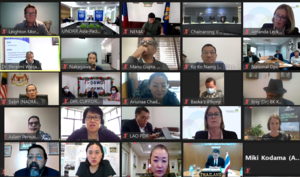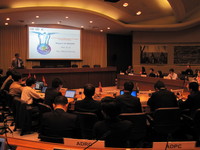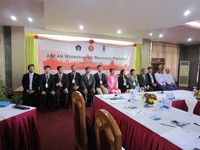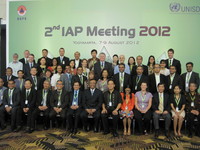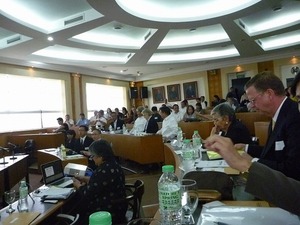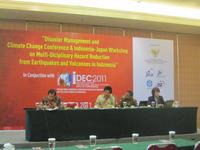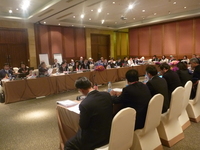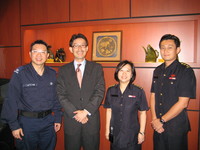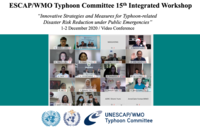
Activity Report: Area & Country >> South East Asia

ADRC participated in the United Nations Office for Disaster Risk Reduction (UNDRR) Asia-Pacific Partnership for Disaster Risk Reduction Forum, which was held online on 1-2 December 2020. The meeting was held online considering the spread of the new coronavirus, however, on both the first and second days, more than 150 representatives of government organizations and related organizations from Asian countries participated and actively exchanged opinions.
At the begining of the Forum on 1 December, Ms. Mami Mizutori, Special Representative of the United Nations Secretary-General for Disaster Risk Reduction, expressed her expectations for this forum. In addition, although each country got quite huge impact of COVID-19, just as the 2004 tsunami strengthened the DRR system in Asia, she called for to use this experience as an opportunity to further strengthen disaster resilience. Next, the representative of Australia, the host country of the Asia-Pacific Ministerial Conference on DRR (APMCDRR) scheduled to be held next year, explained that they are coordinating to hold the extended Conference sometime between April to June. Also she mentioned their efforts to enhance the DRR system in Australia in response to the large-scale bush fire last year. Then, it was followed by speech of the Minister of Ministry of Health and Medical Service of Fiji on their cyclone response activity under the COVID-19 pandemic.
Subsequently, UNDRR reported on the recent trend of disaster occurence in Asia and the results of monitoring of the implementation of the Sendai Framework for Disaster Risk Reduction (SFDRR). It was stated that in order to respond to unexpected disasters and simultaneous disasters, a mutual cooperation system among more parties concerned should be established. Further they informed the situation of collection and analysis of disaster damage data is still insufficient.
In the Panel Discussion, the director of the Australian Institute for Disaster Resilience acted as a moderator, and discussions were held on the theme of risk governance in national and local governments, which have become more aware of their importance following the recent COVID-19 pandemic. Representatives from the Government of India, the Philippine local government, the Vanuatu Disability Support Group, and a researcher in the medical field made presentations from their respective standpoints. Based on the experience of responding to COVID-19, they commonly touched upon the cooperation and partnership system of various stakeholders, the establishment of a permanent cooperation and collaboration system between the health sector and the DRR sector, and the advance planning for the preparation of simultaneous disasters as important points.
At the meeting on 2 December 2, Mr. Hiroko Oura of the International Monetary Fund (IMF) gave a keynote speech on financial risk management, which is one of the themes of APMCDRR. She presented the financial risk that COVID-19 poses to the world is unprecedented, and due to various uncertainties in understanding the risk of unprecedented disasters and predicting climate change, analyzing risks is difficult. She mentioned, on the other hand, it is necessary to carry out risk management based on such a premise. In addition, although the global restriction of social activities by COVID-19 contributed to the reduction of Greenhouse Gas Emissions, it was only temporary, rather it led to the decline in corporate environmental activities due to the deterioration of corporate financial conditions.
Next, the Australian Government explained the composition of APMDRR to be implemented next year and called for the active involvement of many stakeholders.
In the latter half of the meeting, representatives from 22 countries and organizations mentioned their efforts and future prospects, such as improvement of the system to promote the implementation of SFDRR, coordination and adjustments of the system to respond to simultaneous disasters based on the experience of COVID-19.
Finally, UNDRR explained the preparatory process for APMDRR, including of thematic discussions and regional discussion with relevant stakeholders. The Asian Disaster Reduction Center will also be actively involved in this process.
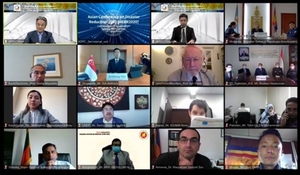
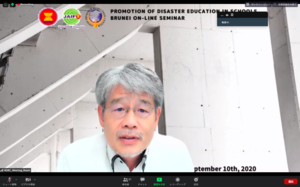
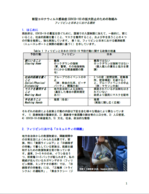
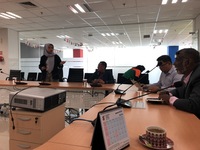
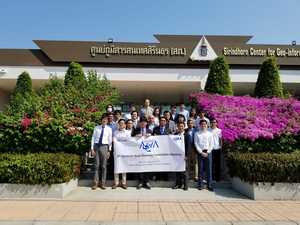
Iriga City, Philippines (November 28-29, 2016)
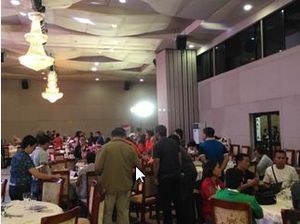
The event was initiated and convened by Iriga City Mayor Madelaine Yorobe Alfelor who was inspired by the outcomes of the Asian Ministerial Conference on Disaster Risk Reduction (AMCDRR) held in New Delhi, India - particularly on the crucial role of local leaders and mayors in implementing the Sendai Framework. During the event in Iriga City, Mayor Alfelor expressed two main reasons why there is a need to gather all local leaders and mayors in the region. One is to advocate for LGU readiness to face risks brought about by hazards, including typhoons, floods, volcanic eruption, and earthquake. The other is to draw commitment of the local chief executives to promote community resilience by adopting the Ten Essentials advanced by the Making Cities Resilient (MCR) campaign
About 85 mayors and over 120 officials from Disaster Risk Reduction Management Office (DRRMO) of each local government participated in the workshop to learn and adopt the Ten Essentials through a two-day workshop facilitated by UNISDR-GETI and IRP. The Ten Essentials is a tool that local governments can apply to strengthen their DRRM plans. Two of the Ten Essentials (9 and 10) pertain to "build back better", and it is in this context that IRP/ADRC shared the global experiences and case studies. By learning from lessons of past experiences, local governments can identify and address their respective weaknesses in disaster risk management.
To forward the recommendations reached at the workshop, the DRRMO officials of the entire Bicol region plan to organize themselves into a platform for sharing knowledge and experiences. In their forthcoming meeting, the DRRMOs will discuss how to implement the identified priority actions they set forth at the workshop in Iriga City.
(2016/11/30 14:40)
November 17-18, 2016 (Manila, Philippines)
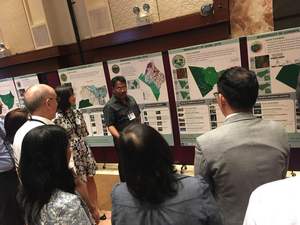
The forum recognized that large-scale disasters often result in changing spatial structures due to corresponding large-scale reconstruction activities. Hence, the recovery process that follows provide opportunities to address both the pre-existing spatial development related challenges as well as the new ones. Some actions that may be introduced to address the issues associated with land use and housing in the post-disaster phase, may include: (i) introducing new land use strategies; (ii) regulating and providing incentives to rebuild away from hazard-prone areas; (iii) proposing new spatial growth models that factor in changing hazard patterns; (iv) addressing issues related to land title and rights; (v) adopting participatory approaches towards rebuilding thereby improving social cohesion; and (vi) undertaking a combination of structural and nonstructural investments to manage future disaster risk.
The forum covered three thematic sessions, where key messages and recommended actions were presented. The first session dealt with recovery policies, wherein policy actions may be focused on addressing the challenges related to the availability of land, risk information, local capacity, finances, and in meeting the speed required to implement activities on the ground. The second session dealt with the horizontal and vertical coordination issues, especially between national and local governments. The suggestion that came up from this session was to revisit and address the underlying causes of disaster risk. Adoption of a system-wide approach (such as focusing on watersheds) and design recovery measures that strengthens vertical and horizontal linkages may help contribute in addressing the issue. The final session dealt with good practices and innovative tools. It is in this session that IRP shared some of the international experiences. The recommendations from IRP included: reviewing past disaster experiences by specifically performing "failure analysis" and "build back better"; selecting from "menu of options" of strategies and actions from global experiences to address recovery issues and challenges - including land use and housing issues; and conducting pre-disaster recovery planning (pre-event research, pre-agreements) to help hasten the effectiveness of land use planning in post-disaster context (i.e. strengthening institutional arrangements, policies, laws, and programs).
(2016/11/21 14:40)
24-26 October 2016 (Cebu City, Philippines)
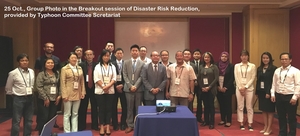 ADRC participated in the 11th Integrated Workshop of Typhoon Committee (TC) which was jointly organized by the United Nations Economic and Social Commission for Asia and the Pacific (UNESCAP), World Meteorological Organization (WMO) TC Secretariat in collaboration with the Philippine Atmospheric, Geophysical and Astronomical Services Administration (PAGASA) and the Local Organizing Committee of Cebu at Waterfront Cebu Hotel on October 24-26, 2016.
ADRC participated in the 11th Integrated Workshop of Typhoon Committee (TC) which was jointly organized by the United Nations Economic and Social Commission for Asia and the Pacific (UNESCAP), World Meteorological Organization (WMO) TC Secretariat in collaboration with the Philippine Atmospheric, Geophysical and Astronomical Services Administration (PAGASA) and the Local Organizing Committee of Cebu at Waterfront Cebu Hotel on October 24-26, 2016.Putrajaya, Malaysia (May 17-18, 2016)
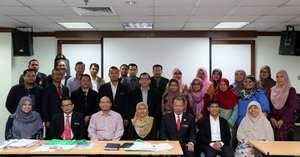 Responding to a formal request from the Universiti Utara Malaysia (UUM) that leads a network of six universities for a research on disaster risk reduction, with special emphasis on flood management, the International Recovery Platform/Asian Disaster Reduction Center (IRP/ADRC) facilitated a two-day orientation workshop on Pre-Disaster Recovery Planning (PDRP). The workshop was held on 17-18 May 2016 at the Systems and Network Department, UNITEN Campus, Putrajaya, Malaysia.
Responding to a formal request from the Universiti Utara Malaysia (UUM) that leads a network of six universities for a research on disaster risk reduction, with special emphasis on flood management, the International Recovery Platform/Asian Disaster Reduction Center (IRP/ADRC) facilitated a two-day orientation workshop on Pre-Disaster Recovery Planning (PDRP). The workshop was held on 17-18 May 2016 at the Systems and Network Department, UNITEN Campus, Putrajaya, Malaysia.
The academic network comprising the Universiti Utara Malaysia (UUM), the Universiti Teknologi Malaysia (UTM), the Universiti Teknologi Mara (UiTM), the Universiti Tenaga Nasional (UNITEN), the Universiti Sains Malaysia (USM), and the Universiti Sains Islam Malaysia (USIM) requested the orientation-workshop to: (i) gain greater understanding of build-back-better through pre-disaster recovery planning for flood as well as the possibility of integrating this concept in the academic courses; (ii) enhance the capacities of faculty members to train other lecturers, students, and practitioners on build back better through pre-disaster recovery planning, and (iii) explore the application of PDRP to achieve a more effective flood management.
About 35 academic professors, lecturers, and officials from the National Government participated the workshop - including representation from all members of the academic network, the Malaysia Civil Defence Department (JPAM), the Ministry of Education (KPM), Fire and Rescue Department (JBP), District of Kemaman, and Mercy Malaysia. Two keynote speeches were delivered to set the tone of the workshop. The first speech was delivered by Mr. Rosman Roslan, District of Officer of Kemaman, Terengganu, highlighting the district's initiative on pre-disaster recovery planning for flood. In particular, the district officer described how Kemaman facilitated the pre-arrangements with hotels and hospitals in case of floods. The second speech was delivered by Mr. Saiful Effendi of the Ministry of Education, where he described the proposed guidelines on disaster risk reduction for public schools. The group exercises of participants came up with two outputs. One was a checklist for pre-disaster recovery planning for Malaysia and the other was a set of strategies and actions for livelihoods recovery.
As for the next steps, the participants agreed to continue the discussions, either physically or virtually. Among the recommended follow-up actions were: (i) documentation of Kemaman flood recovery case and share the report to IRP/ADRC; (ii) review the IRP/ADRC materials on pre-disaster recovery planning and proposed possible module/syllabus for inclusion in academic course; and (iii) production of knowledge products on disaster recovery for flood, including handbooks designed for practitioners and policymakers. The academic network for flood management research in Malaysia is closely working with the Majlis Keselamatan Negara (National Security Council), the Meteorological Department and Department of Irrigation and Drainage (DID), the Kemaman Land and District Office, and the Ministry of Higher Education.
(2016/05/17 14:40)
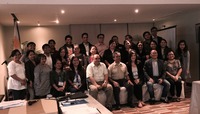
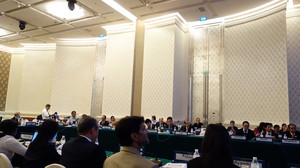
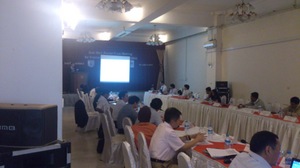
20-24 October 2014 (Bangkok, Thailand)
ADRC participated in the 9th Integrated Workshop of the Typhoon Committee which was jointly organized by the United Nations Economic and Social Commission for Asia and the Pacific (UNESCAP), the World Meteorological Organization (WMO) Typhoon Committee Secretariat on 20-24 October 2014. The more than 80 participants who attended the meeting included representatives from China, D.P.R. Korea, Japan, Lao, Malaysia, Philippines, Republic of Korea, Thailand, US, Viet Nam, Hong Kong and Macao Special Administrative Regions, as well as representatives of the organizing institutions.
The participants discussed their approaches of "Synergized, Integrated, Collaborative Standard Operating Procedures Strategies to Improve Early Warning System for Coastal Multi-hazards" which was the main theme of the meeting. And reports were given on the typhoon damage sustained in each country, as well as on the current year's activities. These included the project on Synergized Standard Operating Procedures for Coastal Multi-hazards Early Warning System (SSOP), in which ADRC is involved.
For the Disaster Risk Reduction Working Group, it was also considered that the participation in the "UN World Conference on Disaster Risk Reduction" at Sendai, Japan on March 2015 as the Typhoon Committee.
The Typhoon Committee has two other working groups covering meteorology and hydrology, in addition to the working group on disaster risk reduction. This time, the three working group meetings were held together as an integrated event.
For more information, visit the Typhoon Committee website:
http://www.typhooncommittee.org/9IWS/
(2014/10/28 19:40)
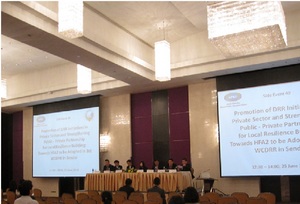
10-13 February 2014 (Bangkok, Thailand)
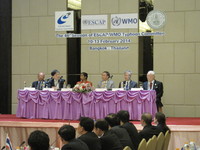 The Asian Disaster Reduction Center (ADRC), participated in the 46th Session of the Typhoon Committee which was jointly organized by the United Nations Economic and Social Commission for Asia and the Pacific (UNESCAP), the World Meteorological Organization (WMO) Typhoon Committee Secretariat, Thai Meteorological Department in Bangkok on 10-13 February 2014.
The Asian Disaster Reduction Center (ADRC), participated in the 46th Session of the Typhoon Committee which was jointly organized by the United Nations Economic and Social Commission for Asia and the Pacific (UNESCAP), the World Meteorological Organization (WMO) Typhoon Committee Secretariat, Thai Meteorological Department in Bangkok on 10-13 February 2014.
The more than 70 participants who attended the meeting included representatives from China, Japan, Malaysia, Philippines, Republic of Korea, Singapore, US, Viet Nam, and the Hong Kong/Macao Special Administrative Regions, as well as representatives of the organizing institutions.
The participants discussed action plan of this committee's three working groups on meteorology, hydrology and disaster risk reduction (DRR) in the next year as well as their activities in the last year.
And the progress of SSOP (Synergized Standard Operating Procedures for Coastal Multi-Hazards Early Warning System) project with which ADRC involves also reported in this session.
Furthermore, regarding the Typhoon Haiyan which raged in the last year, the delegates of Philippines gave a presentation of the damage and the recovery states, and WMO etc reported the assistance for them such as the provision of the typhoon information.
As a result, we had a fruitful discussion such as the enhancement of cooperation among member countries.
For more information, visit
http://www.typhooncommittee.org/46th/index.html
(2014/2/10 19:40)
5-7 November 2013 (Bagan, Myanmar)
Upon the request of ASEAN Secretariat, IRP/ADRC participated in the ASEAN Workshop on Recovery Planning, 5-7 November 2013 at Aye Yar River View Resort in Bagan, Myanmar. The event was aimed at reviewing the progress as well as identifying the gaps/challenges of the Recovery Component of the ASEAN Agreement on Disaster Management and Emergency Response (AADMER) Work Program. The ASEAN Committee on Disaster Management (ACDM) formed a Working Group on Recovery comprising Myanmar and Indonesia as co-chairs and Brunei and Philippines as members. One of the functions of the Working Group is to develop a Toolbox on Recovery to be used by member states in recovery planning.
The toolbox is envisioned as (i) repository of practices and experiences on recovery of ASEAN Member States; (ii) compilation of best practices and other related resources; (iii) recovery guidelines; (iv) capacity building tools and activities; and (v) mechanisms for coordination and resource mobilization. To contribute in achieving this vision, IRP/ADRC shared tools and guidance as well as relevant materials on recovery planning, including guidance notes, recovery planning module, and case studies from around the globe.
As a way forward, IRP/ADRC committed to provide technical assistance to the ACDM's Working Group on Recovery, if needed.
(2013/11/11 14:40)
Myanmar is a disaster prone country. On May 2008, 130,000 people were perished or missed by Cyclone Nargis, and they had floods and landslides in 2010, a heavy earthquake in 2011.
For this reason, the Myanmar Government stipulated the " Myanmar Action Plan for Disaster Risk Reduction" in 2012, and has been promoting various DRR projects based on the Plan. The Myanmar Government decided the establishment of "Disaster Management Training Center" in order to enhance disaster prevention awareness in people and to train the personnel involved in disaster management, and planned to build their facilities in 3 years from 2013.
In 2nd to 4th of July, with the aim of making proposals and advice to the Myanmar Government for training and educational content in the center, sponsored by International Cooperation Agency of Japan (JICA), the United Nations Development Programme, this workshop was held in Nay Pyi Daw, the new capital city of Myanmar. About 80 people from the governments of Asia including Myanmar, international organizations, and NPOs participated in the workshop, and one of the ADRC staff was invited to this workshop.
In the workshop, there were introductions of the education / training center of Thailand and Singapore, JICA and the Asian Disaster Preparedness Center also introduced their international capacity building businesses. The ADRC presented our capacity building activities for Myanmar, such as the Visiting Researcher program in which we invite young officials of member countries to Japan and the DRR training program for local government officials sponsored by Japan-ASEAN Integration Fund.
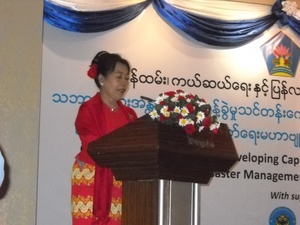
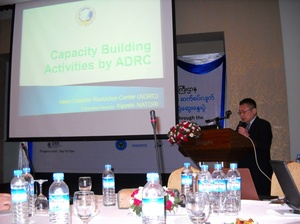
18-19 December 2012 (Bangkok, Thailand)

On 18-19 December 2012, ADRC organized Regional Workshop 2012 on ASEAN Capacity Building of Local Government Officials on Disaster Management project in Bangkok, Thailand. The workshop aims to share experiences through the project in which ADRC and NDMOs of each ASEAN country jointly have conducted since 2008. Thirteen participants from ASEAN states, ASEAN Secretariat and ADRC briefed the activities and discussed the way forward. As many local officials who had attended the training gave favorable comments on this training, it is expected to maintain sustainability of capacity building programs targeting local officials to meet various needs and situations of countries and areas. ADRC would like to extend sincere appreciation to all ASEAN NDMOs, local governments and relevant organizations that have cooperated in the project.
(2012/12/27 17:40)
7-9 August 2012 (Jogjakarta, Indonesia)
ADRC participated in the ISDR Asia Partnership (IAP) meeting held on 7-9 August in Jogjakarta, Indonesia. The meeting was attended by more than 100 participants, including representatives from many countries in Asia as well as from international and inter-governmental organizations.
The meeting covered the following topic.
1 ) Update on preparations for the 5th AMCDRR
Reports were given on the status of preparations for the 5th Asian
Ministerial Conference on Disaster Risk Reduction scheduled to be
held in Jogjakarta on 22 to 25 October this year.
2 ) Draft of the Jogjakarta Declaration and the Stakeholders'
Addendum
Participants discussed a draft of the Jogjakarta Declaration and
the Stakeholders' Addendum for the 5th AMCDRR.
3 ) HFA review and monitoring
Based on the Hyogo Framework for Action (HFA), Nepal, Sri Lanka,
Myanmar, Vietnam, and others reported their activities.
4 ) Post-HFA framework
Participants discussed a post-HFA framework based on the
challenges presented by the HFA.
Presentations were given by ADPC (DRR Project Portal Site),
UN-SPIDER (Disaster Management using Satellites) and others.
ADRC works to build disaster-resilient communities and to establish networks among countries through its ongoing participation in international conferences.
(2012/08/14 19:40)

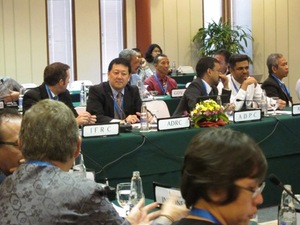
21-22 March, 2012 (Bangkok Thailand)
The Workshop on Use of Multi-Global Navigation Satellite Systems for Sustainable Development organized by UNESCAP and supported by JAXA, was held in Bangkok, Thailand from 21 to 22 March 2012.
Government officials and experts from 13
countries and intergovernmental organizations participated in the workshop and
discussed potential utilization of Multi-Global Navigation Satellite Systems
(Multi-GNSS) in the fields of transportation, disaster risk reduction and
agriculture.
http://www.unescap.org/idd/events/2012-Workshop-Multi-GNSS-21-22-Mar-2012/index.asp
(2012/3/23
11:30)
14-16 February 2012 (Kuala Lumpur, Malaysia)
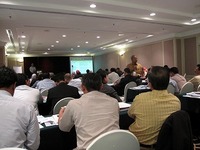
From 14 to 16 February 2012, Asian Disaster Reduction Center (ADRC) conducted workshop on DRM in Kuala Lumpur, Malaysia targeting local government officials. Malaysia's National Security Council (NSC) and ADRC have been prepared for this training since 2009. Some 80 local officials in charge of DRM nationwide as well as NSC and line departments attended the workshop.
The officials from NSC, Malaysian Meteorological Department (MMD) and relevant agencies gave lectures in this training, followed by Training of Trainers in 2010. The attending local officials, who are expected to play a pivotal role in community-based disaster risk management (CBDRM), learned topics such as NSC Directive, flood management, early warning and recovery efforts from tsunami in Malaysia and Japan and had group discussion on CBDRM. The training program drew a lot of interest from the participants and invited active discussion.
The workshop put an end to the training program in Malaysia but it is hoped that capacity building activities of local officials and communities will extend leading to further strengthen disaster resilience of the country.
(2012/2/27 17:40)
27-29 January 2012 (Jakarta, Indonesia)
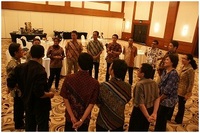
From 27 to 29 January 2012, Indonesia's National Disaster Management Agency (BNPB) and Asian Disaster Reduction Center (ADRC) conducted Training of Trainers (TOT) for officials in charge of disaster risk management in Jakarta. This is part of a capacity building project in Southeast Asia that ADRC has been engaged in since 2008. Selected BNPB officials joined the TOT in order to serve as lecturers in coming workshop in the provinces.
The program focused on DRR topics such as recovery from disasters, raising public awareness as well as learning effective training skills. Even in a short period, 20 officials had intensive training and prepared for presentation till late at night. The participants made presentations in groups in accordance with their specialties in DRM and improved their understanding and training skills through interactive discussion and evaluation.
The participants of the TOT will conduct in subsequent training at local levels and it is expected that they will be able to facilitate fruitful training activities.
(2012/2/8 17:40)
13-14 December 2011 (Brunei)
ADRC has been implementing web-based GLIDE-associated disaster database development project in ASEAN countries since 2008 with the financial support by Japan ASEAN Integration Fund. The objective of this project is to facilitate all ASEAN countries to develop their own national disaster databases with GLIDE numbers incorporated by training government officials in charge of disaster information in ASEAN countries.
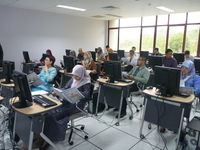
ADRC held operator training for both GLIDE and DesInventar with kind support from National Disaster Management Center (NCDM) and UNISDR at Brunei University.
About 25 government officials from related departments participated in the training and actively exchanged views and opinions for future enhancement of the systems in Brunei.
(2011/12/14 11:30)
6 December 2011 (Thailand)
Asian Disaster Reduction Center started consultation with relevant orgnizations to explore possible and appropriate cooperation activities in recovery process from the devastating floods in Thailand. Please refer to the ADRC Highlights Vol. 225 at http://www.adrc.asia/highlights/NewsNo225.
(2011/12/06 13:10)
31 October -1 November (Jakarta, Indonesia)
This two-day symposium was organized jointly by Government of Indonesia, the Economic Research Institute for ASEAN and East Asia (ERIA) and Harvard University. Under the main theme of "Moving ASEAN Community Forward into 2015 and Beyond", the symposium discussed various issues on the fulfillment of the ASEAN Economic Community that is due on 2015 and the future challenges beyond the date.
Among three substantive sessions organized, the ADRC participated in 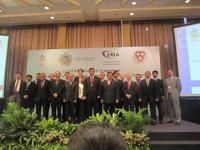 the Session 2: Moving the ASEAN Community Forward through Strengthening of Regional Corporation: Engendering a Resilient and Harmonious ASEAN whereby making a presentation "Strengthening regional cooperation in times of disaster".
the Session 2: Moving the ASEAN Community Forward through Strengthening of Regional Corporation: Engendering a Resilient and Harmonious ASEAN whereby making a presentation "Strengthening regional cooperation in times of disaster".
In the outcome document titled"Jakarta Framework on Moving ASEAN Community Forward into 2015 and Beyond", it is mentioned that "the issues of resiliency, especially food security and energy security, as well as disaster management, have been identified as important challenges to be tackled" and "ASEAN's increasing demand for food and energy is even more challenging given the risks of natural disasters, for the fact that Asia is the most disaster prone region in the world."
(2011/11/02 13:10)
27 October 2011 (Jakarta, Indonesia)
The Conference "Disaster Management and the Impact of Climate Change" was organized by the Coordinating Ministry for People's Welfare, Republic of Indonesia as part of "The Indonesian Disaster Preparedness, Response and Recovery, EXPO and Conference (IDEC)2011.
It was jointly organized by the JST-JICA Project "Multi-disciplinary Hazard Reduction from Earthquakes and Volcanoes in Indonesia. 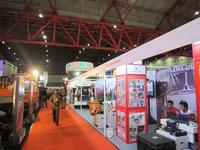 Hence, members of the JST-JICA Project participated in the Conference, Specifically, three members made presentations, focusing on recent disasters in Indonesia and in Japan, which included the presentation "Policy Response to 3.11 Earthquake and Tsunami Disaster" done by Mr. Atsushi Koresawa of the Center.
Hence, members of the JST-JICA Project participated in the Conference, Specifically, three members made presentations, focusing on recent disasters in Indonesia and in Japan, which included the presentation "Policy Response to 3.11 Earthquake and Tsunami Disaster" done by Mr. Atsushi Koresawa of the Center.
The joint coordination of the Conference demonstrated the importance and relevance of the activities that the JST-JICA Project were engaged in.
(2011/10/28 13:10)
27-28 October 2011 (Jakarta, Indonesia)
ADRC has been involved in a project to promote the "Multi-disciplinary Hazard Reduction from Earthquakes and Volcanoes in Indonesia" since 2009. As part of the project, many universities and research institutions in Japan and Indonesia have conducted research on disaster mitigation. And the international conference that served as the final meeting of this project was held on 27-29 Oct 2011 in Jakarta, Indonesia. At this meeting, participants reported on all their research and results. ADRC presented a "Guidebook for Teachers" as the outcome document of its exploration of ways to promote disaster education and raise disaster awareness, and to promote partnerships between Indonesian and Japanese government agencies and research institutions.
26 - 27 September 2011 (Yangon, Myanmar)
From 2 to 3 September 2011, Rescue and Resettlement Department (RRD) of the Government of Myanmar and the Asian Disaster Reduction Center (ADRC) jointly conducted a workshop to promote capacity building of local government officials in Myanmar. The workshop was held in Yangon in which more than 30 government officials from different localities participated.
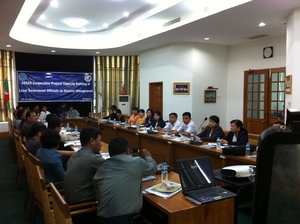
This workshop was conducted as part of the ongoing project which RRD and the ADRC have been implementing since 2010 and has been financed by the Japan ASEAN Integration Fund. Prior to the workshop, training of trainers (TOT) was conducted in March this year. As a result, three out of the ten TOT participants delivered lectures at the workshop this time.
In the workshop, lectures on Total Disaster Management (TDM), Disaster Risk Reduction (DRR) measures and an incident command system in Myanmar, and other issues were delivered by the ADRC, RRD and the TOT trainees. Moreover, following these lectures, a hazard mapping exercise as a field activity and entailing discussion were also conducted.
The local government officials who participated in the workshop showed strong interest in exploring these issues thereby engaging very actively in close discussion and an exchange of opinions. The town watching conducted in areas which were severely affected by the cyclone Nargis in 2008 and activities for awareness raising on DRR for the villagers contributed to assuring the importance of DRR not only among the local officials but also the villagers.
Another two workshops are planned to be held this year, one in Mandalay and the other in Ayeyarwady. It is expected that the project will be useful for the capacity development of local government officials in the country.
29 August -1 September 2011 Honai, Hue and Ho Chi Minh City, Vietnam
As part of an ongoing study on the use of ICT for disaster preparedness and response in ASEAN countries, ADRC has recently visited Hanoi, Hue and Ho Chi Minh City in Vietnam to interview experts at various government's institutions, including Vietnam Ministry of Agriculture and Rural Department and Ministry of Natural Resources and Environment, and collect information relevant to this subject.
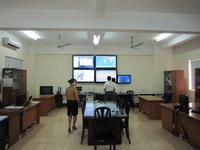 The use of ICT for disaster preparedness and response has been making a steady progress in Vietnam, in particular weather forecasting and monitoring, risk assessment and risk mapping, early warning to communities and people, etc. Moreover, state-of-art ICT technologies have been widely applied such as broadband networking of observation stations and automatic communication by mobile phone, but mostly on an experimental basis.
The use of ICT for disaster preparedness and response has been making a steady progress in Vietnam, in particular weather forecasting and monitoring, risk assessment and risk mapping, early warning to communities and people, etc. Moreover, state-of-art ICT technologies have been widely applied such as broadband networking of observation stations and automatic communication by mobile phone, but mostly on an experimental basis.
While good progress has been made for typical meteorological and hydrological hazards such as typhoon and flooding, relatively less progress has been made for landslide, flash flood, and geological hazards such as earthquake and tsunami. Among them, tsunami warning system (towers) has recently been developed in Da Nang city in Central Vietnam, but more has to be done in view of future tsunami risks in its long coastal line. Likewise, disaster preparedness and response capacity could be further enhanced if it would make more use of such ICT technologies as information sharing system among various institutions, remote sensing, imaging system, real-time measurement sensor, etc.
The result of the study will be used as a basis on which further cooperation is planned. We appreciate greatly kind cooperation extended by the Disaster Management Center (DMC) of the Ministry of Agriculture and Rural Development.
(2011/9/2 13:10)
28-29 July 2011 (Da Nang, Vietnam)
The APEC Workshop on Facing Abnormal Flood Disaster: New Vision for APEC Member Economies was organized by Vietnamese Government from 28 to 29 July 2011 at Life Style Resort Hotel in Da Nang, Vietnam.
The workshop was attended by experts from APEC member economies as well as experts from international organizations. Invited by the Vietnamese Government, IRP/ADRC also participated in the Workshop.
The Workshop addressed: a) Abnormal flood disasters in Asia-Pacific region and the experience of APEC economies in responding to such challenges; b) Best practices on emergency preparedness and response to abnormal flood disasters; c) New vision for APEC members in abnormal flood management. IRP/ADRC presented the experience and lessons learned from the Great East Japan Earthquake and Tsunami disaster. The presentation drew a lot of attention, specifically on how Japan - a developed country - organizes recovery activities.(2011/7/30 14:00)
26 May-4 Jun, Bandar Seri Begawan, Brunei Darussalam
Asian Disaster Reduction Center (ADRC) conducted the program "Capacity Building of Utilization of Satellite Image for Disaster Management" in Bandar Seri Begawan, Brunei Darussalam from 26th May to 4th Jun, in cooperation with Asian Institute of Technology (AIT).
This program consists of one-day seminar and five- day training to promote the utilization of space based technology. It was held in collaboration with Remote Sensing Center, Survey Department, Brunei Darussalam.
This is one of four capacity development programs in ASEAN countries that ADRC has been implementing since 2008, with other three including disaster education promotion, development of Web-based GLIDE-associated disaster database and capacity building of local government officials.
Satellite Images has been utilized to implement emergency activities in Brunei Darussalam.
However, the experience of the engineers for utilization of the satellite data in Brunei Darussalam is insufficient. The capacity building of engineers in relevant field is in urgent need.
The theme of case study is Flood. The satellite images before and after the flood were compared, which defined the flooding area.
ADRC will continue to cooperate with Survey Department, Brunei Darussalam and other relevant agencies to further promote the utilization of satellite data in the field of disaster management. ADRC also plans to conduct the series of program in other ASEAN countries.
For more details of this project, please visit ADRC web site (http://www.adrc.asia/top_j.php).
2011/6/2 13;20
9-10 May 2011 (Cambodia)
The ADRC attended the 22st meeting of sub-committee on space technology and applications (SCOSA) held from 9th to 10th May 2011 in Siem Reap, Cambodia.
Various organizations in ASEAN countries which are related to the space technology attended this meeting in order to discuss on-going and future projects by SCOSA and other relevant. .
For the last two year the ADRC has been implementing "Satellite Data Utilization for Disaster Risk Reduction and Response" funded by Japan-ASEAN Integration Fund (JAIF). Eight ASEAN countries, namely, Indonesia, Philippines, Lao PDR, Myanmar, Thailand, Vietnam, Cambodia and Brunei Darussalam are the target countries of the project.
In this meeting, ADRC made a progress report on the project.
ADRC is currency producing materials to be used at planned seminars and trainings in each ASEAN country.
For more details of this project, please look at the following site; http://www.geoinfo.ait.ac.th/adrc/index.htm
2011/6/2 13;20
23-25 March 2011 (Jakarta, Indonesia)
The Jakarta International Defense Dialogue (JIDD), hosted by the Indonesian Ministry of Defense and organized by the Indonesian Defense University, was held at Jakarta Convention Center in Jakarta, Indonesia. The core objective of the Dialogue was the promotion of intergovernmental cooperation to meet common threats such as disaster and terrorism, and explore disaster management and counterterrorism measures.
About one thousand participants from different countries and agencies gathered for this event. Among the countries represented were Bangladesh, Brunei Darussalam, Cambodia, India, Indonesia, Korea, Laos, Malaysia, Myanmar, Pakistan, Singapore, Australia, United States. Some European countries and agencies of United Nations were also represented. ADRC, represented by Senior Administrative Manager Mr. Masataka Onishi, presented the Emergency Response System in Japan. Mr.Onishi highlighted the disaster management system as well as outlined the impact of the tsunami that flattened many towns and communities situated at the Pacific coast of Tohoku region caused by "Great Eastern Japan Earthquake" of March 11, 2011. How the Japanese central and local governments have been responding to the disaster was emphasized in the presentation. Many of the participants showed deep condolence for the victims of the disaster and some briskly asked questions about sharing of responsibilities among central and local governments in disaster response.
14-17 March 2011, Yangon, Myanmar
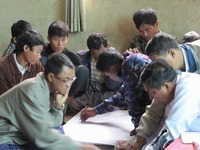 On 14 - 17 March 2011, Relief and Resettlement Department (RRD) of Ministry of Social Welfare of Myanmar, and Asian Disaster Reduction Center (ADRC) conducted Training of Trainers (TOT), a part of capacity building program for local government officials on disaster management, which ADRC has conducted since 2008 in ASEAN member countries. In Myanmar, the project was launched in 2010. With the participation of 30 participants including government officials from Yangon, Mandalay and Ayeyarwardy divisions, relevant organizations and NGOs, RRD and ADRC, the TOT covered such topics as early warning, damage & needs assessment, earthquake & tsunami and climatological disaster management followed by town watching and hazard mapping in Yangon suburbs. The participants of this training will then give lectures at coming workshops in the above-mentioned districts targeting local government officials.
On 14 - 17 March 2011, Relief and Resettlement Department (RRD) of Ministry of Social Welfare of Myanmar, and Asian Disaster Reduction Center (ADRC) conducted Training of Trainers (TOT), a part of capacity building program for local government officials on disaster management, which ADRC has conducted since 2008 in ASEAN member countries. In Myanmar, the project was launched in 2010. With the participation of 30 participants including government officials from Yangon, Mandalay and Ayeyarwardy divisions, relevant organizations and NGOs, RRD and ADRC, the TOT covered such topics as early warning, damage & needs assessment, earthquake & tsunami and climatological disaster management followed by town watching and hazard mapping in Yangon suburbs. The participants of this training will then give lectures at coming workshops in the above-mentioned districts targeting local government officials.Before the opening of the training, the participants offered silent prayers for the victims of Tohoku-Pacific Ocean Earthquake in Japan which occurred on 11 March 2011.
(2011/03/28 17:40)
As a result of elaboration and discussion, a pilot lesson and seminar will be held at the beginning of March.
Note: This project is part of the Japan-ASEAN Integration Fund Projects and aimed to promote disaster education in ASEAN countries through such means as training of school teachers followed by school lessons facilitated by trained teachers.)
28 February-5 March, Hanoi, Vietnam
14-19 March, Jakarta, Indonesia
Asian Disaster Reduction Center (ADRC) conducted the program "Capacity Building of Utilization of Satellite Image for Disaster Management" in Hanoi, Vietnam from 28th Feb to 5th March, Jakarta and Indonesia from 14th to 19th March in cooperation with Asian Institute of Technology (AIT).
This program consists of one-day seminar and five- day training to promote the utilization of space based technology. It was held in collaboration with Remote Sensing Center, Ministry of Natural Resources and Environment (MONRE), Vietnam and Indonesian National Institute of Aeronautics and Space (LAPAN).
This is one of four capacity development programs in ASEAN countries that ADRC has been implementing since 2008,with other three including disaster education promotion, development of Web-based GLIDE-associated disaster database and capacity building of local government officials.
Satellite Images has been utilized to implement emergency activities in Vietnam and Indonesia. However, the experience of the engineers for utilization of the satellite data in these countries is insufficient. The capacity building of engineers in relevant field is in urgent need.
In Vietnam, the theme of case study is Flood. The satellite images before and after the flood were compared, which defined the flooding area.
In Indonesia, the theme of the case study is Tsunami. The struck area of the tsunami has been extracted from the simulation result of the tsunami.
ADRC will continue to cooperate with MONRE, LAPAN and other relevant agencies to further promote the utilization of satellite data in the field of disaster management. ADRC also plans to conduct the series of program in other ASEAN countries.
For more details of this project, please visit ADRC web site (http://www.adrc.asia/top_j.php).
12011/03/30 13:20
22-25 February 2011, Indonesia
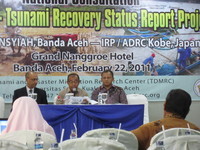 IRP/ ADRC team visited Indonesia to strengthen partnerships in recovery, including consultation and review of Aceh Post-Tsunami Recovery both at Banda, Aceh with TDMRC and Jakarta with BRR Institute.
IRP/ ADRC team visited Indonesia to strengthen partnerships in recovery, including consultation and review of Aceh Post-Tsunami Recovery both at Banda, Aceh with TDMRC and Jakarta with BRR Institute.
The recovery status report on Aceh Tsunami focuses on the learning's along sectors of livelihoods, shelter, infrastructure, and governance. Challenges and lessons were highlighted to inform other governments and relevant stakeholders of unique experience and initiatives. The IRP/ADRC team provided comments, and took advantage of the presence of key actors on Aceh Recovery by providing brief orientation on Disaster Recovery Planning as well as presentation of IRP/ADRC knowledge products and services.
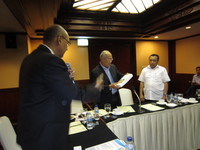 In Jakarta, IRP/ADRC team participated in the BRR Institute Workshop "Governance of Recovery: Lessons from Housing, Settlement and Infrastructure". IRP/ADRC introduced the platform and the lessons from recovery focusing on identified themes. The event attracted high level participation, including vice ministerial levels and heads of development organizations in Indonesia totaling to about 40 delegates. Some were from central government bodies, local governments, universities and research centers. IRP/ADRC publications were circulated and some displayed at the workshop. IRP /ADRC symbolically provided one set of guidance notes on recovery to BRR Institute to promote partnership. Some copies of guidance notes were also given to ministries and representatives of local governments. Among the key outcomes that relate to IRP/ADRC were: (i) potential transfer of IRP training module to BRR Institute, including training of trainers; (ii) closer partnership in the knowledge management function of recovery; and (iii) membership of Government of Indonesia in the IRP Steering Committee.
In Jakarta, IRP/ADRC team participated in the BRR Institute Workshop "Governance of Recovery: Lessons from Housing, Settlement and Infrastructure". IRP/ADRC introduced the platform and the lessons from recovery focusing on identified themes. The event attracted high level participation, including vice ministerial levels and heads of development organizations in Indonesia totaling to about 40 delegates. Some were from central government bodies, local governments, universities and research centers. IRP/ADRC publications were circulated and some displayed at the workshop. IRP /ADRC symbolically provided one set of guidance notes on recovery to BRR Institute to promote partnership. Some copies of guidance notes were also given to ministries and representatives of local governments. Among the key outcomes that relate to IRP/ADRC were: (i) potential transfer of IRP training module to BRR Institute, including training of trainers; (ii) closer partnership in the knowledge management function of recovery; and (iii) membership of Government of Indonesia in the IRP Steering Committee.
The IRP/ADRC team also visited AHA Centre facility, President's Delivery Unit Office for Development Monitoring and Oversight, BNPB, and Australia-Indonesia Facility for Disaster Reduction (AIFDR) to strengthen partnerships in recovery.
(2011/03/22 14:00)
18-19 February 2011 (Malacca, Malaysia)
The National Disaster Awareness Day 2011 was held in Malacca, Malaysia on 18 and 19 February 2011. The event was organized by the National Security Council (NSC) of Malaysia. The Asian Disaster Reduction Center (ADRC) was invited to participate.
More than a thousand representatives from international organizations, the ASEAN countries, national and local governments attended the event. On Day One, ADRC, at the request by the organizer, gave a presentation on "Total Disaster Risk Management" in the plenary session. Under the theme "Mainstreaming Disaster Risk Reduction into Development Policy, Planning and Implementation", the seminar was organized into four sessions: Session 2A "Role of Local Authorities in DRR", Session 2B "ASEAN Knowledge Sharing Workshop on Mainstreaming DRR in Education", Session 2C "Hospital Safe from Disasters" and Session 2D "National Disaster Management Mechanism."
On Day Two, in conjunction with this event, the ceremony on National Launching of UNISDR World Disaster Reduction Campaign was held with Y.A.B. Tan Sri Muhyiddin bin Mohd Yassin, Deputy Prime Minister of Malaysia, in attendance.
(2011/02/19 17:30)
1-2 February 2011 (Bangkok, Thailand)
The Asian Disaster Reduction Center (ADRC) held the first regional workshop of the Japan-ASEAN Integration Fund Project on "Capacity Building in the Utilization of Satellite Images for Disaster Management" from 1 to 2 February 2011.
This workshop was organized in cooperation with the Asian Institute of Technology (AIT) and was held at the AIT Conference Center in Bangkok, Thailand.
This is one of the four capacity development programs in ASEAN countries that ADRC has been implementing since 2008, with other three including disaster education promotion, development of Web-based GLIDE-associated disaster database and capacity building of local government officials.
The purpose of the workshop was to allow relevant personnel to share information from the Report from the Seminar and Training for the Utilization of Satellite Images for Disaster Management, as well as other information regarding the use of satellite image for disaster management. The 27 participants, who represented the ASEAN countries, the ASEAN secretariat, the Japanese Embassy in Thailand, and UN agency, discussed efforts to promote the use of satellite images for disaster management activities.
The key points discussed were as follows:
1) Close ties between space organizations and disaster management organizations
2) Effective use of satellite information and the development of expertise and technologies
3) Use of ICTs other than satellite technologies to strengthen disaster management capacity
4) Mutual learning among countries though regional mechanisms
ADRC will continue to cooperate with relevant agencies to further promote the utilization of satellite data in the field of disaster management in ASEAN region.
For more details of this project and the result of this workshop, please visit ADRC web site (http://www.adrc.asia/top_j.php).
2011/02/21 13:20
7 January 2011, Nay Phi Taw, Myanmar
On 7 January 2011, Myanmar's Relief and Resettlement Department (RRD), Ministry of Social Welfare and Asian Disaster Reduction Center (ADRC) held a preparatory meeting for Training of Trainers under ASEAN Project, Capacity Building of Local Government Officials on Disaster Management in its capital Nay Phi Taw. Around 20 participants from RRD, relevant agencies, NGOs and ADRC discussed training method and topics for effective and efficient implementation of the coming training, which will cover such topics as comprehensive disaster risk management, early warning and emergency response.
(2011/01/12 17:40)
Note: This project is part of the Japan-ASEAN Integration Fund Projects and aimed to promote disaster education in ASEAN countries through such means as training of school teachers followed by school lessons facilitated by trained teachers.)
25-28 October 2010, Incheon, Republic of Korea
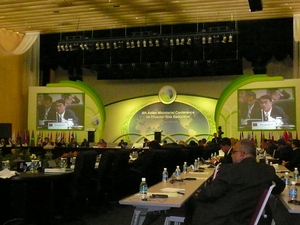 ADRC participated in the 4AMCDRR held in Incheon, Republic of Korea from 25 - 28 October 2010. More than 900 participants comprising ministers of disaster management from 53 Asia-Pacific and European nations, representatives from UN agencies, international organizations, and NGOs attended the conference. The Prime Ministers of Republic of Korea and Kingdom of Bhutan were among the high level participants.
ADRC participated in the 4AMCDRR held in Incheon, Republic of Korea from 25 - 28 October 2010. More than 900 participants comprising ministers of disaster management from 53 Asia-Pacific and European nations, representatives from UN agencies, international organizations, and NGOs attended the conference. The Prime Ministers of Republic of Korea and Kingdom of Bhutan were among the high level participants.
Under the theme "Disaster Risk Reduction through Climate Change Adaptation" (DRR through CCA), the conference was organized into three sessions: Session 1 "Raising awareness and building capacity for DRR & CCA", Session 2 "Developing and sharing information, technology, sound practices, and lessons learned in climate & disaster risk management", and Session 3 "Promoting integration of DRR & CCA into development for green growth". ADRC chaired Technical Session 1 and co-chaired the High Level Round Table of Session 1 (HLRT1) with the Maldives and Bhutan.
The outcomes of the technical session emphasized two key concerns. One is the need for training for both government officials and civil society organizations. The other is the need to learn from local and indigenous peoples on how they manage risk and the need to support their efforts in raising awareness. In this regard, it was suggested that DRR and CCA should be framed within local and national development planning. At the HLRT1, the ministers expressed problems of their countries, including issues on raising awareness and building capacity. HLRT1 recognized that problems vary from country to country, and that solutions need to be localized. HLRT1 had drawn commitments from delegates to work together and share technical knowledge. Recommendations from Technical Session and HLRT1 were reflected into the conference outcome documents: Incheon Declaration, Incheon Regional Roadmap or REMAP, and Incheon Action Plan aimed at establishing climate resilient disaster risk management systems by 2015 that will contribute to sustainable development at the regional, national and community levels.
ADRC also co-organized various side events at 4AMCDRR including "Incorporating space-based information and technologies into DRR and CCA" with UNOOSA, "Asian Film Festival on Disaster Management" with GFDR and ADPC, and "A tool for Better Recovery: Introduction to Guidance Notes on Climate Change Adaptation and Recovery" with IRP. The next AMCDRR will be held in Indonesia in 2012 and the progress of REMAP will be reviewed accordingly.
For more information on ADRC's activities during the 4th AMCDRR, please see the ADRC Highlights to be issued shortly.
(2010/10/25 16:50)
ADRC held the First Coordination Meeting for Japan-ASEAN Integration Fund Project "Promotion of Disaster Education of Schools" in collaboration with the Ministry of Education of Lao People's Democratic Republic. In the meeting, the project outline was introduced by ADRC. Then, Ministry of Education reported the latest situation of disaster education in Laos. Some materials and teacher's manual have been already developed in Laos, and it is agreed to effectively use these existing materials for our activity.
Hereafter, the teaching materials will be drafted for the Training of Pilot Teachers.
17-23 October, Phnom Penh, Cambodia
Asian Disaster Reduction Center (ADRC) conducted the program "Capacity Building of Utilization of Satellite Image for Disaster Management" in Phnom Penh, Cambodia from 17th to 23rd October, in cooperation with Asian Institute of Technology (AIT).
This program consists of one-day seminar and five- day training, both to promote the utilization of space based technology. Especially the theme of this project in Cambodia was the drought. It was held in collaboration with Ministry of Land management, Urban Planning & Construction, Department of Geography in Cambodia.
This is one of the four capacity development programs in ASEAN countries that ADRC has been implementing since 2008, with other three including disaster education promotion, development of Web-based GLIDE-associated disaster database and capacity building of local government officials.
Satellite Images has been utilized to implement emergency activities in Cambodia. However, the experience of the engineers for utilization of the satellite data in these countries is insufficient. The capacity building of engineers in relevant fields is an urgent need.
ADRC will continue to cooperate with Department of Geography and other relevant agencies to further promote the utilization of satellite data in the field of disaster management. ADRC also plans to conduct this program in other ASEAN countries.
For more details of this project, please visit ADRC web site (http://www.adrc.asia/top_j.php).
2010/10/25 13:20
6th October 2010 (Yangon, Myanmar)
ADRC has been implementing web-based GLIDE-associated disaster database development project in ASEAN countries since 2008 with the financial support by Japan ASEAN Integration Fund. The objective of this project is to facilitate all ASEAN countries to develop their own national disaster databases with GLIDE numbers incorporated by training the invited government officials in charge of disaster information in ASEAN countries at ADRC. In 2010 the training program is scheduled for Cambodia, Indonesia and Myanmar, ADRC held kick-off meeting with Relief and Resettlement Department Myanmar on 6th October and agreed to cooperate with the GLIDE-associated disaster database development project.(2010/10/7 11:30)
28 September - 2 October (Padang, Indonesia)
Large-scale inter-plate earthquakes have occurred recurrently in Indonesia, particularly around Sumatra Island, but it has been reported by many experts that such an earthquake is likely to happen off Padang in West Sumatra within thirty years or so.
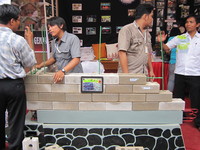 To prepare for such large-scale earthquakes, it is of urgent need to establish early-warning and transmission system, development of practical technologies for reduction of building vulnerability and community-based disaster risk management. Hence, two day workshop on 29 and 30 September was organised which coincided with one-year commemoration of the Padang Earthquake on 30 September 2009.
To prepare for such large-scale earthquakes, it is of urgent need to establish early-warning and transmission system, development of practical technologies for reduction of building vulnerability and community-based disaster risk management. Hence, two day workshop on 29 and 30 September was organised which coincided with one-year commemoration of the Padang Earthquake on 30 September 2009.
The National Graduate Institute for Policy Studies (GRIPS), the National Research Institute for Earthquake Science and Disaster Prevention (NIED) and the Asian Disaster Reduction Center (ADRC) from Japan, and the Metrological, Climatology and Geophysical Agency (BMKG), the Institute Technology Bandung (ITB) and Andalas University (UNAND) from Indonesia, among others, jointed the workshop.
As a result of discussion, it reached a consensus that future collaboration should focus on three substantive areas, namely early warning for earthquakes, practical technologies for reduction of building vulnerability and community-based disaster risk management. (2010/10/4 13:10)
21-23 September 2010 (Kuala Lumpur, Malaysia)
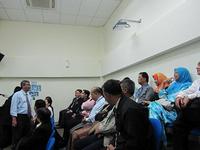
For three days starting from 21 October 2010, Malaysia's National Security Council (NSC) and Asian Disaster Reduction Center (ADRC) conducted a workshop in Kuala Lumpur as part of a community-based disaster risk management project. Nearly 50 people participated from various organizations including NSC, other disaster-related institutions, and municipalities
The workshop started with the opening remarks by NSC Secretary Hon. Datuk Mohamed Thajudeen Abdul and Mr. Ogu Salim bin Omar, Under Secretary of Disaster Management Division, NSC, in which were stated great expectation toward strengthening disaster resilience of communities in the country through this training. Then experts from ADRC, NSC, other relevant agencies and a local NGO gave lectures such as Total Disaster Risk Management, policy and mechanism on Malaysia's disaster management, various disaster risk reduction activities. Followed by the lectures, participants visited Malaysian Meteorological Department and Department of Irrigation and Drainage to learn weather and river monitoring systems and practices.
The participants showed great interests in the lectures with active discussion during the workshop. From now on, municipal and community-level training is scheduled in the country where the participants of this workshop will then give lectures as trainers.
Since 2009 NSC and ADRC have been implementing a project for capacity building of local government officials in Malaysia, which could have synergy effects on this CBDRM activity.
(2010/10/15 17:40)
September - October 2010 (Cebu, Davao, and Manila, the Philippines)
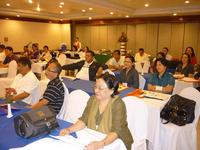
From September to October 2010, the Philippines' Office of Civil Defense (OCD) / National Disaster Coordination Council (NDCC) and Asian Disaster Reduction Center (ADRC) conducted workshops for capacity building of local government officials in Cebu, Davao and Manila.
These workshops are part of a project which OCD/NDCC and ADRC have been promoting since 2009. Prior to these, training of trainers (TOT) was conducted this March and the ten participants of the TOT then gave lectures at workshops this time.
The workshops in Cebu (16-17 September), Davao (27-28 September) and Manila (7-8 October), with participation of more than 120 officials, covered topics such as scope of newly approved Disaster Risk and Reduction Management Act, contingency planning, incident command system and disaster-specific management like earthquake and tsunami, and typhoon followed by hazard mapping as field activity.
The participants showed great interests in these topics, actively exchanging opinions during lectures. Through town watching in disaster-prone areas, they reassured the importance of raising awareness of local officials and communities.
It is hoped that the experience of this project will be utilized for the capacity development of local government officials in the country.
(2010/10/15 17:40)
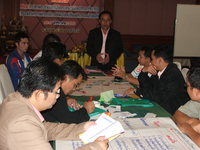 Department of Disaster Prevention and Mitigation (DDPM) of Thailand's Ministry of Interior and Asian Disaster Reduction Center (ADRC) jointly organized a workshop for local government officials in its northeastern province Khon Kaen at Khon Kaen Hotel on 30-31 August.
Department of Disaster Prevention and Mitigation (DDPM) of Thailand's Ministry of Interior and Asian Disaster Reduction Center (ADRC) jointly organized a workshop for local government officials in its northeastern province Khon Kaen at Khon Kaen Hotel on 30-31 August.This workshop was part of capacity building program of local government officials for ASEAN countries, under which DDPM and ADRC had prepared since 2009 for further promoting capacity development. And it was a final activity of this program in Thailand.
A total of 41 local officials attended the workshop to take lectures on disaster risk management and countermeasures and to visit disaster-prone areas for making hazard maps as a case study. The participants reassured the importance of promoting disaster risk management activities in their areas through the workshop.
Led by experienced trainers, who are government officials themselves, the workshop facilitated active participation of many participants from surrouding areas. Further, the trainers improved their teaching materials and methods through three previous workshops within this program. Therefore, it is expected that DDPM will continue activities of this kind in other areas of Thailand by making good use of the experiences of this program.
30 August-1 September 2010, Tokyo, Japan
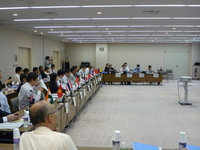
As a partner organization, ADRC participated in the ASEAN plus Three International Conference on Disaster Management in Tokyo.
ASEAN Plus Three International Conference on Disaster Management, hosted by the Ministry of Foreign Affairs of Japan in close cooperation with the Cabinet Office of Japan, United Nations International Strategy for Disaster Reduction (ISDR), Japan International Cooperation Agency (JICA) and Asian Disaster Reduction Center (ADRC), with participation of officials and academic experts from ASEAN countries Plus Three countries and observer countries such as Australia and India as well as other international organizations, was convened on 30 August-1 September 2010 in Tokyo, Japan.
The Meeting reviewed the progresses and challenges in the first half decade of the HFA 2005-2015 in the region and discussed to identify new challenges in the next half decade of the HFA with a view to contributing to the Mid-Term Review of the HFA. Participants of the Meeting shared the view that progresses have been made at both national and regional levels.
It was also pointed out that adaptation to climate change should be linked with disaster risk reduction policy in each country and facilitated through the regional cooperation in view of the disaster management.
The Meeting also acknowledged the important role of ADRC to the regional cooperation in Asia on disaster management and recognized valuable and significant activities of JICA in bilateral cooperation on disaster management through the Official Development Assistance of Japanese government.
-Note-
ASEAN Plus Three; ASEAN Member States (Brunei Darussalam, the Kingdom of Cambodia, the Republic of Indonesia, the Lao People's Democratic Republic, Malaysia, the Union of Myanmar, the Republic of the Philippines, the Republic of Singapore, the Kingdom of Thailand and the Socialist Republic of Vietnam) and People's Republic of China, Japan and Republic of Korea
11-20 August, Bangkok, Thailand
27 August-3 September, Manila, Philippines
10-17 September, Nay Pyi Taw, Myanmar
Asian Disaster Reduction Center (ADRC) conducted the program "Capacity Building of Utilization of Satellite Image for Disaster Management" in Bangkok, Thailand from 11th to 20th Aug, Manila, Philippines from 27th Aug to 3rd Sep, and Nay Pyi Taw, Myanmar from 10th to 17th Sep in cooperation with Asian Institute of Technology (AIT).
This program consists of one-day seminar and five- day training, both to promote the utilization of space based technology. It was held in collaboration with Geo-informatics and Space Technology Development Agency (GISTDA), Thailand, Philippines Institute of Volcanology and Seismology (PHIVOLCS), and Ministry of Science and Technology (MOST), Government of Myanmar, respectively.
This is one of the four capacity development programs in ASEAN countries that ADRC has been implementing since 2008, with other three including disaster education promotion, development of Web-based GLIDE-associated disaster database and capacity building of local government officials.
Satellite Images has been utilized to implement emergency activities in Thailand, Philippines and Myanmar. However, the experience of the engineers for utilization of the satellite data in these countries is insufficient. The capacity building of engineers in relevant fields is an urgent need.
ADRC will continue to cooperate with GISTDA, PHIVOLCS, MOST and other relevant agencies to further promote the utilization of satellite data in the field of disaster management. ADRC also plans to conduct this program in other ASEAN countries.
For more details of this project, please visit ADRC web site (http://www.adrc.asia/top_j.php).
(2010/10/06 13:20)
14-23 July 2010, Vientiane, Lao PDR
Asian Disaster Reduction Center (ADRC) conducted the program "Capacity Building of Utilization of Satellite Image for Disaster Management" in Vientiane, Lao PDR from 14 to23 July 2010. This program consisted of one-day seminar and five- days training both to promote the utilization of space based technology, and it was conducted in collaboration with Asian Institute of Technology (AIT), and the Remote Sensing Center of Water Resources & Environment Institute, Water Resources and Environment Administration under Prime Minister Office (RSC/WREI/WREA), Government of Lao PDR.
This is one of the four capacity development programs in ASEAN countries that ADRC has been implementing since 2008, with other three including disaster education promotion, development of Web-based GLIDE-associated disaster database and capacity building of local government officials.
Satellite Images were utilized to estimate flood damages and to implement emergency activities when Vientiane was heavily inundated in August 2008. Through this experience, a shortage of engineers capable of applying space based technology to disaster management was recognized so that capacity building of engineers in relevant fields has become an urgent need.
ADRC will continue to cooperate with RSC/WREI/WREA and other relevant agencies to further promote the utilization of satellite data in the field of disaster management in Lao PDR. ADRC also plans to conduct this program in other ASEAN countries.
For more details of this project, please visit the following web site.
http://www.geoinfo.ait.ac.th/adrc/index.htm
(2010/08/02 13:20)
Indonesia, 13-16 July, 2010
ADRC and Bandan National Penanggulangan Bencana (National Disaster Management Agency, BNPB) have lunched "the Project on Capacity Building of Local Government Officials on Disaster Management."
This project is one of four capacity development projects for the ASEAN member countries that ADRC has been conducting since 2008 and Indonesia is belonging the 3rd year Group composed of Singapore and Myanmar.
Geographically Indonesia is an archipelago situated at a juncture of four tectonic plates where seismic and volcanic activities occur constantly. They make for a high potential and proneness to disasters, including earthquakes, tsunamis, and volcanic eruptions. Also, because of topographical and hydro-metrological conditions, the country is subject to disaster such as floods, landslides, forest fires and drought, too. There is thus an urgent need to further strengthen the capacity building of local government officials in charge of disaster management, as they play a critical role in every phase of the disaster management cycle.
On 13-16 July 2010, ADRC and BNPB held a kick off meeting on the project targeting local government officials.
ADRC and BNPB will work together on the implementation of the 20-manth project form 2010 to 2011, starting with the creation of an expert team tasked with the development of training materials.
(2010/07/20 17:30)
5-8 July 2010, Manila, Philippines
Sentinel ASIA Joint Project Meeting(JPTM) was held in Manila, the Philippines on 5-8 July 2010. It was organized jointly by Japan Aerospace Exploration Agency (JAXA), United Nations Economic and Social Commission for Asia and the Pacific (UNESCAP) and Department of Science Technology (DOST), Gov. of the Philippines. 71 people from 22 countries (36 organizations) and 5 international organizations participated in the meeting.
ADRC functions as a single window to receive emergency observation request for their screening and onward transmission to space agencies in the framework of Sentinel ASIA. At the meeting, ADRC reported the status of the emergency observations that were implemented in the last ○○ months, the results of survey on how provided satellite data was utilized in each country, and the current situation of the ADRC GLOF project. The themes of discussion in this meeting are as follows:
Progress of Sentinel Asia step2
Current situation of each JPT member
Activities of Forest fire Working Group
Activities of Flood Working Group
Activities of Glacier Lake Outburst Flood (GLOF) Working Group
Collaboration with Sentinel Asia and International Disaster Charter
ADRC will continue to promote the use of satellite data utilization for disaster reduction in Asia in cooperation with Sentinel Asia secretariat. For more details of this meeting, please refer to the Sentinel ASIA web site.
(2010/08/02 13:20)
23-24 June 2010, Nay Phi Taw, Myanmar
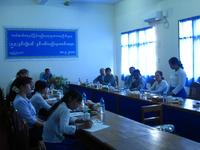
Myanmar's Relief and Resettlement Department (RRD) under Ministry of Social Welfare and Asian Disaster Reduction Center (ADRC) have launched a program, Capacity Building of Local Government Officials on Disaster Management.
This is one of the four capacity development programs for ASEAN countries that ADRC has been conducting since 2008, including disaster education promotion, utilization of satellite image on disaster management and development of Web-based GLIDE-associated database on natural hazards.
On 23-24 June 2010, RRD and ADRC held a kickoff meeting to discuss implementation of the program. Myanmar, which incurred devastating damages from 2008 Cyclone Nargis, is exposed to various disaster risks such as storms, floods, landslides, earthquakes, tsunami, droughts and fires. Thus it is of urgent need to further strengthen capacity of government officials in charge of disaster management.
RRD and ADRC will cooperatively work for the implementation of the program, starting with setting up an expert team for training materials development.
(2010/06/30 17:40)
17-18 June 2010 (Bangkok, Thailand)
The ADRC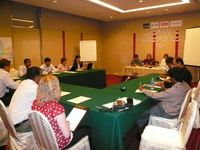 participated in the "Orientation Training on the Use of DRR Project Portal" developed under the IAP initiative on Regional Stocktaking and Mapping of DRR interventions, held in Bangkok, Thailand on 17-18 June 2010. The training was organized by the Asian Disaster Preparedness Center (ADPC) in partnership with UNISDR and with support from the Asian Development Bank (ADB). Approximately 30 officers from IAP members and other organizations in Asia and the Pacific joined the training.
participated in the "Orientation Training on the Use of DRR Project Portal" developed under the IAP initiative on Regional Stocktaking and Mapping of DRR interventions, held in Bangkok, Thailand on 17-18 June 2010. The training was organized by the Asian Disaster Preparedness Center (ADPC) in partnership with UNISDR and with support from the Asian Development Bank (ADB). Approximately 30 officers from IAP members and other organizations in Asia and the Pacific joined the training.
In the training, participants learnt about the DRR Project Portal, including its usage, and also discussed on possible ways to increase the use of the DRR Project Portal and challenges in updating information. This portal is expected to contribute to promoting coordination and collaboration among DRR practitioners in Asia and the Pacific, avoiding duplications of activities, and better planning and programming in Asia and the Pacific.
The ADRC would like to provide support to the portal and contribute to further promoting it among DRR practitioners in Asia and the Pacific.
(2010/06/30 16:50)
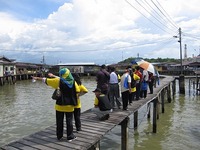
Brunei's National Disaster Management Center (NDMC) and ADRC had been prepar ing for training of local government officials in the country since May 2009.
The workshop on 7-8 June, extending its target to community level, was attended by some 100 people composed of government officials and residents including community leaders and school children from a water village, Kampong Ayer in Bander Seri Begawan.
On the first day, the participants took lectures such as disaster risks in the village and contingency planning followed by town watching. After developing hazard maps on the second day, the results were reported to be shared among residents. Emergency aid and fire & rescue exercise also participated in the workshop.
As Kampong Ayer is a disaster-prone area such as storms, floods and fires, the residents were so ardent and even asked for further workshops along thie line in the future.
Under the project of capacity building of local government officials in ASEAN members, similar activities are now scheduled in Indonesia, Malaysia, Myanmar, the Philippines, Singapore and Thailand.
(2010/06/18 17:40)
20 May 2010 (Makati City, Philippines)
Atsushi KORESAWA of ADRC attended the ASEAN Agreement on Disaster Management and Emergency Response (AADMER) Partnership Conference held on 20 May 2010 in Makati City, the Philippines.
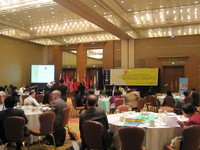 The ASEAN Committee on Disaster management (ACDM) adopted the AADMER Work Programme at its 15th Meeting in March in Singapore. The AADMER Work Programme is expected to contribute to the resiliency of peoples belonging to the ASEAN community of ten nations. It also contributes to the achievement of the global priorities stipulated in the Hyogo Framework for Action (HFA).
The ASEAN Committee on Disaster management (ACDM) adopted the AADMER Work Programme at its 15th Meeting in March in Singapore. The AADMER Work Programme is expected to contribute to the resiliency of peoples belonging to the ASEAN community of ten nations. It also contributes to the achievement of the global priorities stipulated in the Hyogo Framework for Action (HFA).
At the Conference, the ACDM members explained the ADDMER Work Programme in some details with the intention of gathering support from partners for the implementation of the AADMER Work Programme, particularly Phase 1 (2010-2012) flagship projects. The ADRC was invited as one of those partners.
ADRC has already engaged in the implementation of similar activities both within and outside ASEAN countries and accumulated relevant experiences and expertise. Therefore, the ADRC would be pleased to be involved in some of the ASEAN flagship projects presented in coming years.
( 2010/05/31 13:10)
17-18 May, Vientiane, Lao PDR
The ADRC attended the 21st meeting of sub-committee on space technology and applications (SCOSA) held from 17th to 18th May 2010 in Vientiane, Lao PDR.
Various organizations in ASEAN countries which are related to the space technology attended this meeting in order to discuss on-going and future projects by SCOSA and other relevant. .
For the last two year the ADRC has been implementing " Satellite Data Utilization for Disaster Risk Reduction and Response" funded by Japan-ASEAN Integration Fund (JAIF). Eight ASEAN countries, namely, Indonesia, Philippines, Lao PDR, Myanmar, Thailand, Vietnam, Cambodia and Brunei Darussalam are the target countries of the project.
In this meeting, ADRC made a progress report on the project.
ADRC is currency producing materials to be used at planned seminars and trainings in each ASEAN country which will be implemented from July this year.
For more details of this project, please look at the following site ; http://www.geoinfo.ait.ac.th/adrc/index.htm
(2010/05/26 13:20)
5-6 May, Singapore
The roundtable on Asian Regionalism was organized by the Asia Pacific Economic Cooperation (APEC) forum, Centre on Asia and Globalization (CAG) at the Lee Kuan Yew School of Public Policy and the Center for Strategic and International Studies (CSIS) on 5-6 may at the LKY School in Singapore. Many experts in the fields of energy security, climate change and natural disaster response attended the roundtable from across Asia.
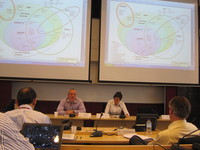 The Asian Disaster Reduction Center had been involved in the preparatory process to some extent, but the organizers invited Mr. Atsushi KORESAWA of the ADRC as one of the discussants in the session "Response to Natural Disasters." He presented why ADRC was established and how ADRC has been conducting its activities as one example of many regional/sub-regional organizations in Asia, especially focusing on its comparative advantages. The head of SAARC Disaster Management Centre in New Delhi and the executive director of the Pacific Disaster Center in Hawaii also participated in the session as discussants.
The Asian Disaster Reduction Center had been involved in the preparatory process to some extent, but the organizers invited Mr. Atsushi KORESAWA of the ADRC as one of the discussants in the session "Response to Natural Disasters." He presented why ADRC was established and how ADRC has been conducting its activities as one example of many regional/sub-regional organizations in Asia, especially focusing on its comparative advantages. The head of SAARC Disaster Management Centre in New Delhi and the executive director of the Pacific Disaster Center in Hawaii also participated in the session as discussants.
CSIS will produce a report by reflecting discussions at this forum. It has become certain hat disaster management has been gaining its importance in the context of the non-traditional security areas. However, it has been recognized that there are many disaster management related activities conducted by many different organizations which have some similarities or commonalities and thus some rationalization is required to make them more effective and useful.
ADRC will continue to conduct its activities in good collaboration with other organizations and focus on areas which ADRC has comparative advantages.
Note)
CAG: Centre on Asia and Globalisation, Lee Kuan Yew School of Public Policy, National University of Singapore
CSIS: Center for Strategic and International Studies, Washington
(2010/05/12 13:10)
15 April 2010 (Manila) 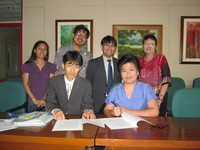 IRP facilitated coordination meetings with the Center for Disaster Preparedness (CDP) and the National Disaster Coordinating Council (NDCC) in the Philippines to document recovery lessons from Leyte Landslide of 2006. CDP is a resource center that works with NGOs, people's organizations, communities, and government agencies to enhance capacities in disaster preparedness, mitigation, emergency response, and recovery while NDCC is the national platform for disaster preparedness and emergency response. The meeting with CDP was held at CDP Conference Room, College of Social Work and Community Development (CSWCD) building, University of the Philippines, Diliman, Quezon City. In that meeting, IRP presented the rationale for developing the recovery status report and emphasized the importance of highlighting innovative practices and experience to generate knowledge build-up in recovery. The report will be used as part of the resources in developing the "Guidance Notes for Recovery", which is intended for national and local government to ensure "build back better". One important output of the meeting is the signing of contract between CDP and IRP/ADRC.
IRP facilitated coordination meetings with the Center for Disaster Preparedness (CDP) and the National Disaster Coordinating Council (NDCC) in the Philippines to document recovery lessons from Leyte Landslide of 2006. CDP is a resource center that works with NGOs, people's organizations, communities, and government agencies to enhance capacities in disaster preparedness, mitigation, emergency response, and recovery while NDCC is the national platform for disaster preparedness and emergency response. The meeting with CDP was held at CDP Conference Room, College of Social Work and Community Development (CSWCD) building, University of the Philippines, Diliman, Quezon City. In that meeting, IRP presented the rationale for developing the recovery status report and emphasized the importance of highlighting innovative practices and experience to generate knowledge build-up in recovery. The report will be used as part of the resources in developing the "Guidance Notes for Recovery", which is intended for national and local government to ensure "build back better". One important output of the meeting is the signing of contract between CDP and IRP/ADRC.
After meeting CDP, IRP paid courtesy visits to NDCC and Office of Civil Defense (OCD) to inform these offices of the project. IRP coordinates closely with these government offices to draw more inputs and make the recovery status report more useful to decision-makers and practitioners. The visits resulted in NDCC and OCD's expression of support to the project, especially in organizing a "national consultation" scheduled in November 2010, where concerned stakeholders in the Philippines will be gathered to validate and improve the recovery status report.
(2010/04/27 14:00)
26 March 2010 (Yogyakarta, Indonesia)
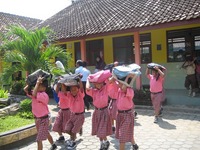
The pilot lesson and seminar for "Promotion of Disaster Education of Schools" project was held in Yogyakarta, Indonesia, from 26th to 27th March. It was organized jointly by the Ministry of National Education of Indonesia and the Asian Disaster Reduction Center (ADRC). More than fifty teachers of primary school and lots of students attended this two-day workshop.
On 26th March, teachers had a lecture "Basic Knowledge about Natural Disaster" for student based on the subjects lectured in the Training of Trainers (TOT) in March 2010. And they also conducted "Evacuation Drill against Earthquake" for students of each class on the same day. And the next day, participants including teachers, experts and the ADRC summarized the whole program of this project during the seminar. It was suggested that continuous activity by themselves and support by national/local government will be necessary for the spread of disaster education.
ADRC hopes that the outcome of this project will be shared in other schools on disaster education throughout the Indonesia.
Note: This project is part of the Japan-ASEAN Integration Fund Projects and aimed to promote disaster education in ASEAN countries through such means as training of school teachers followed by school lessons facilitated by trained teachers.)
(2010/04/19 18:30)
25-26 March 2010 (Thua Thien Hue, Vietnam)
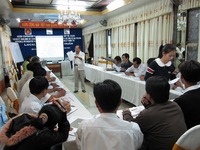
Vietnam's Central Committee for Flood and Storm Control (CCFSC) and the Asian Disaster Management Center (ADRC) organized a workshop for local government officials in Thua Thin Hue province on 25-26 March 2010. A total of thirty-five officials from the province, the CCFSC and the ADRC participated in the two-day workshop.
As part of ASEAN project Capacity Building of Local Government Officials on Disaster Management, this workshop marked the third one in the country followed by those in Thien Giang and Lao Cai provinces.
In this workshop, local officials took lectures including institutional and legal framework of provincial disaster risk management, early warning and Japan's experiences based on the subjects lectured in the Training of Trainers (TOT) in June 2009 where the trainers had participated. Owing to the assistance of the CCFSC and provincial officials, the trainers gave lectures in instructive and interactive manners, bringing about active discussion and fruitful feedback.
ADRC hopes that the outcome of this project will be shared in other provinces and contribute to capacity development of local officials on disaster management throughout the country.
Likewise the workshops for local government officials are scheduled in Brunei, Malaysia, the Philippines and Thailand in 2010.
(2010/03/31 17:40)
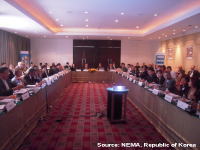 The ADRC attended the ISDR Asia Partnership (IAP) Meeting held from 24 to 26 March 2010 in Bangkok. The meeting focused on the next cycle of HFA (Hyogo Framework for Action) progress reporting, the process and implications of HFA Mid-term review, and the preparations for the Fourth Asian Ministerial Conference on Disaster Risk Reduction (AMCDRR). As many as 80 participants, including government officials from the Asian countries, as well as representatives of international and regional organizations such as ASEAN, APEC, and SOPAC attended the meeting. The ADRC introduced the result of the ACDR2010 and future expected activities based on the recommendations made in the conference.
The ADRC attended the ISDR Asia Partnership (IAP) Meeting held from 24 to 26 March 2010 in Bangkok. The meeting focused on the next cycle of HFA (Hyogo Framework for Action) progress reporting, the process and implications of HFA Mid-term review, and the preparations for the Fourth Asian Ministerial Conference on Disaster Risk Reduction (AMCDRR). As many as 80 participants, including government officials from the Asian countries, as well as representatives of international and regional organizations such as ASEAN, APEC, and SOPAC attended the meeting. The ADRC introduced the result of the ACDR2010 and future expected activities based on the recommendations made in the conference.
11-12 March 2010 (Singapore)
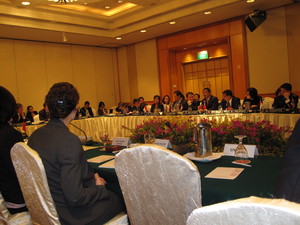
As a partner organization, ADRC participated in the 15th Meeting of ACDM and 4th ACDM+3 Senior Officials Meeting (SOM) in Singapore.
One of the highlights of ACDM meeting, 11 March 2010, was the turnover of chairmanship from Myanmar to the Philippines. Under the new chair, ACDM aims to achieve two major objectives for 2010: (i) the implementation of AADMER Work Programme for 2010-2015 and (ii) the establishment and operationalization of AHA Centre.
During ACDM+3SOM, 12 March 2010, representatives from Government of Japan re-announced its assistance to ASEAN's efforts in Disaster Reduction under the Japan-ASEAN Integration Fund (JAIF) which focus on (i) enhancing ASEAN's capacity for emergency response to large-scale disaster based on the AADMER, (ii) supporting the improvement of the disaster prevention ability of AHA Centre and construction of the disaster information and communication system that allows the utilization of satellite, and (iii) implementing the following four (4) projects through the activities of ADRC:
• Promotion of Disaster Education in Schools
• Capacity Building of Local Government Officials on Disaster Management
• Utilization of Satellite Image on Disaster Management, and
• Development of Web-based GLIDE Associated Disaster Event Databases for ASEAN Countries.
In the ACMD+SOM, ADRC made a presentation on the progress of above four (4) on-going ASEAN Cooperation Projects implemented by ADRC and expressed continuous support for the iplementation of the cited JAIF projects.
(2010/03/23 17:30)
8 March 2010 (Bangkok, Thailand)
The new web system that been produced as part of Sentinel Asia Step 2 for the last two years will start its operation from April 2010.
The Sentinel Asia Secretariat, ADRC and other relevant agencies held a meeting at Geo-informatics and Space Technology Development Agency, GISTDA, in Bangkok, Thailand, to share information on the new web system.
The new web site is located at;
https://sentinel.tksc.jaxa.jp
(2010/03/30 13:20)
1-4 March 2010 (Hanoi, Vietnam)
Sentinel Asia (https://sentinel.tksc.jaxa.jp) implemented the emergency observation by satellite and provided the satellite image date, upon the request from Remote Sensing center, Ministry of Natural Resource and Environment, Vietnam, in response to the flood that occurred in central Vietnam in September 2009.
In order to survey how the provided satellite image data was utilized for disaster response and immediate recovery, ADRC in cooperation with JAXA has conducted the hearing survey to the staff of member the Remote Sensing Center and conducted the field survey to compare the provided satellite image data and actual situation of observed area by satellite.
The results of this survey will be used to the further promote and the disaster management.
(2010/03/30 13:20)
1 March 2010 (Yogyakarta, Indonesia)
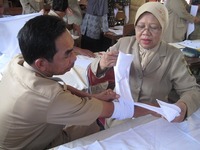
The Training of Pilot Teachers for "Promotion of Disaster Education of Schools" project was held in Yogyakarta, Indonesia, from 1st to 2nd March 2010. It was organized jointly by the Ministry of National Education of Indonesia and the Asian Disaster Reduction Center (ADRC). More than fifty teachers of primary school, including experts as lecturer, attended this two-day workshop.
Participants took lectures about "Latest Situation of Disaster Education in Japan", "Earthquake Disaster Risk Reduction in Japan", "Basic Knowledge about Natural Disaster", etc. In the past, there were lots of earthquakes in this province including the latest one in 2006, claimed more than 6,000 lives. Therefore, participants joined in this workshop with a passionate concern. In particular, "First aid training" was effective tool for them to support their students.
As a result of elaboration and discussion, a pilot lesson and seminar will be held on 26th and 27th March this year.
Note: This project is part of the Japan-ASEAN Integration Fund Projects and aimed to promote disaster education in ASEAN countries through such means as training of school teachers followed by school lessons facilitated by trained teachers.)
(2010/4/19 18:30)
Thailand and the Philippines
February - March 2010
From late February through early March 2010, the Asian Disaster Reduction Center (ADRC) conducted trainings for government officials in charge of disaster management with Thailand's Department of Disaster Prevention and Mitigation (DDPM), and Philippines' Office of Civil Defense (OCD) and National Disaster Coordination Council (NDCC) in Bangkok and Manila respectively. (Photos: Thailand and the Philippines, from above)
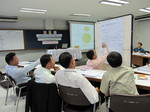 The trainings are part of ASEAN cooperation project Capacity Building of Local Government Officials on Disaster Management. ASEAN's national disaster management organizations and the ADRC conduct training for trainers (TOT) and then the trainers give lectures at workshops for local government officials in each country.
The trainings are part of ASEAN cooperation project Capacity Building of Local Government Officials on Disaster Management. ASEAN's national disaster management organizations and the ADRC conduct training for trainers (TOT) and then the trainers give lectures at workshops for local government officials in each country.
 During this TOT in Thailand and the Philippines, the participants took lectures on various DRR/DRM topics developed by experts from each country such as the institutional framework of DM system in their countries and disaster-specific issues including flood, tropical storm, earthquake and tsunami. The two trainings drew positive response from the attendants, resulting in active discussion among them over the covered topics and coming workshops. They will give lectures as trainers in subsequent workshops for local officials, which are scheduled in the middle of this year.
During this TOT in Thailand and the Philippines, the participants took lectures on various DRR/DRM topics developed by experts from each country such as the institutional framework of DM system in their countries and disaster-specific issues including flood, tropical storm, earthquake and tsunami. The two trainings drew positive response from the attendants, resulting in active discussion among them over the covered topics and coming workshops. They will give lectures as trainers in subsequent workshops for local officials, which are scheduled in the middle of this year.
(2010/03/08 17:40)
29 January 2010 (Indonesia)
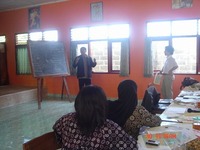
"Promotion of Disaster Education in Schools" Project in Indonesia
ADRC collaborated with Indonesia' Ministry of National Education to organize the second coordination meeting for "Promotion of Disaster Education of Schools" project in Indonesia. First, ADRC and a task-team on the Indonesia side discussed situation report on disaster education in Indonesia and provisional education materials on 28th. It was followed by a meeting with provincial education bureau's officials and a principal and teachers of a pilot school in Yogyakarta on 29th. As a result of elaboration and discussion, ADRC and Task-Team decided that a training program for school teachers be held on 1st- 2nd March this year.
Note: This project is part of the Japan-ASEAN Integration Fund Projects and aimed to promote disaster education in ASEAN countries through such means as training of school teachers followed by school lessons facilitated by trained teachers.)
(2010/02/22 18:30)
January - February 2010 (Cambodia)
Cambodia's National Committee for Disaster Management (NCDM) and the Asian Disaster Reduction Center (ADRC) conducted a series of workshops for local government officials in charge of disaster management in Kompong Chhnang, Pursat and Kompong Thom provinces from late January to early February 2010. Some 30 local officers at each province, totaling 90, participated in the workshops
The workshops are part of the ASEAN Capacity
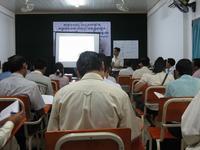 Development of Local Government Officials on Disaster Management, which ADRC and disaster management organizations in ASEAN countries have started since 2008. In Cambodia, following Training of Trainers (TOT) in June 2009, the workshops were held by inviting lectures from the 10 local officials from the provinces who participated in the TOT.
Development of Local Government Officials on Disaster Management, which ADRC and disaster management organizations in ASEAN countries have started since 2008. In Cambodia, following Training of Trainers (TOT) in June 2009, the workshops were held by inviting lectures from the 10 local officials from the provinces who participated in the TOT.
Workshop included lectures such as the national disaster management system, information on disaster risks, and total disaster risk management and Town Watching and hazard mapping to increase their expertise on DRR and how to raise public disaster awareness.
With participants' active discussion and cooperation by NCDM and the local officials, the workshops resulted in success. The outcome of the workshops is expected to be shared with other provinces as well.
(2010/01/25 17:40)
1-3 December 2009 (Manila, Philippines)
The ADRC has been collaborating with the Japan Aerospace Exploration Agency (JAXA) to promote a disaster reduction project using satellite imaging data in the Asian region.
On September 26, Typhoon Ketsana (Japan Meteorology Agency designation: No. 16) swept across the Central Luzon in the Philippines. The typhoon brought the extremely heavy rainfall to Metro Manila or the National Capital Region resulting in extensive flood damages..
Upon request from the Philippine Institute of Volcanology and Seismology (PHIVOLCS), ADRC coordinated the emergency observation by earth observation satellite agencies and then satellite data was provided to PHIVOLCS by Sentinel Asia.
The ADRC mission visited PHIVOLCS, Office of Civil Defense, National Disaster Management Center and Mines & Geosciences Bureau to conduct a follow-up survey on the use of the satellite data. The mission also conducted a on-site survey to compare the satellite image with actual situation in Metro Manila.
(2009/12/04 17:30)
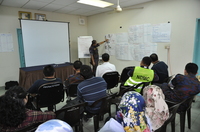
The National Disaster Management Centre of Brunei Darussalam and the ADRC conducted a training of trainers (TOT) in Bandar Seri Begawan on 16 - 19 November, 2009. The training is a part of the ASEAN project Capacity Building of Local Government Officials on Disaster Management which started in 2008 aiming at strengthening the capacity of local officials in charge of disaster management. The ADRC and national disaster management organizations plan to cooperatively conduct trainings for local government officials in each ASEAN member country.
This TOT in Brunei Darussalam was attended by some twenty participants from DRR and relevant departments including fire department. On the first and second days of the training, the participants received lectures such as the disaster management systems of Brunei Darussalam and Japan, Hyogo Framework for Action (HFA), and disaster-specific countermeasures to further acquire their knowledge on DRR. On the third day, they conducted town watching, developed community-based multi-hazard maps in Tutong district, and discussed how to raise public awareness of the community. The trainers who have just completed the training this time will then provide trainings to local government officials at subsequent workshops. Also, the ADRC will implement TOTs and local workshops in other ASEAN countries next year.
(2009/12/15 17:40)
3-5 November 2009 (Yogyakarta, Indonesia)
The International Recovery Platform (IRP), the Asian Disaster Reduction Center (ADRC), and the Department of Architecture and Planning of Gadjah Mada University (DAP/UGM) organized the IRP Regional Workshop "Action by Stakeholders for Effective Management of Post-Disaster Recovery" from 3-5 November 2009 at Gadjah Mada University in Yogyakarta, Indonesia.
The following is the highlights of the Workshop.
(2009/11/5 14:20)
27-28 October 2009 (Singapore)
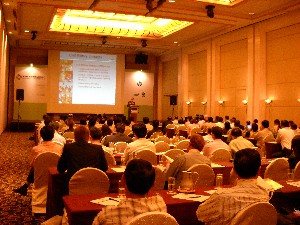
Around 100 delegates from Asian countries, including government officials and security managers at the private sector, participated in the work shop.
4-8 October 2009(Padang, Indonesia)
ADRC sent a team of two senior researchers to Indonesia to make an immediate assessment of areas stricken by the earthquake of 30th September off Sumatra Island. Mr. Masaru Arakida and Mr. Tetsuo Ibaraki, both from ADRC, visited Padang City, Pariaman City, Padang-Pariaman District of West Sumatra Province from 5 to 7 October 2009. Their primary objective was to explore how ADRC and other relevant organization could help disaster stricken areas recover and rebuild their communities based on their assessment. The following is a snapshot of the mission.
(2009/10/22 16:40)
3-4 September 2009 (Jakarta, Indonesia)
The ADRC visited ASEAN Secretariat to discuss how to proceed on with the Feasibility Study on ASEAN Coordination Centre for Humanitarian Assistance on Disaster Management (AHA Centre) and how to prepare for a future project on disaster management communication network system in the ASEAN. The ADRC will be participating in the F/S on AHA Centre which aims to examine, inter alia, requirements and necessary resources for the AHA Centre to become fully operational.
The ADRC also visited the JST-JICA Project office to discuss how to implement the JST-JICA Project for Multi-disciplinary Hazard Reduction from Earthquakes and Volcanoes in Indonesia. Funded by JICA (Japan international Cooperation Agency) and JST (Japan Science and Technology Agency), the project aims to strengthen the platform of collaboration among researchers and officials concerned with disaster risk. The project team is composed of 6 groups, among which the ADRC has taken part in Group 6: Application of the research and establishment of collaboration mechanism between researchers and the government officials and Group 5: Education and outreach for disaster reduction.
(2009/09/10 13:10)
ADRC participated in the ACDM Working Group Meeting on Risk Assessment, Monitoring and Early Warning
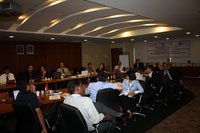
In the meeting, the participants including representatives from the ASEAN Secretariat, the ASEAN-US Technical Assistance and Training Facility, the United Nations Development Programme (UNDP), the Pacific Disaster Center (PDC), the Republic of Singapore, the Kingdom of Cambodia, the Republic of the Philippines, the Republic of Indonesia, the Socialist Republic of Vietnam discussed the framework for risk assessment, monitoring and early warning across the ASEAN countries.
The ADRC made a joint presentation with the UNDP and the PDC on the importance of Disaster Inventories for Disaster Risk Reduction. The ADRC will actively participate in the future meetings so that the advanced experience and know-how of Japan in this field can be transferred to the ASEAN countries.
2009/08/17-18 (Bangkok, Thailand)
ADRC organized a regional workshop as part of the "ASEAN Cooperation Project on Capacity Building for Local Government Officials on Disaster Management" in Bangkok, Thailand on 17-18 August 2009 with precious support from Department of Disaster Prevention and Mitigation (DDPM) of the Thai Government.
ADRC has been implementing the JAPAN-ASEAN Integration Fund (JAIF) Project "the Capacity Building for Local Government Officials on Disaster Management" since August 2008. In implementing this project, ASEAN member countries have been divided into the following three groups:
•First Year Group (August 2008 - March 2010): Cambodia,
Lao PDR and Vietnam;
•Second Year Group (May 2009 - December 2010): Brunei
Darussalam, Malaysia, Philippines, and Thailand; and
•Third Year Group (February 2010 - September 2011): Indonesia,
Myanmar and Singapore.
The workshop in Bangkok was attended by countries of all three groups so as to achieve the following objectives:
(1) To better understand the concept and direction of
this project in ASEAN;
(2) To facilitate information sharing on the implementation of
the project; and
(3) To help improve the conduct of the project by learning from
the countries that has undertaken the project.
In the Introductory Session, ASEAN Secretariat and ADRC made presentations on the JAIF Project and the progress in this project made to date respectively. In the subsequent sessions, the representatives of each group presented the progress in this project made so far and relevant issues followed by lively discussion and exchange of ideas among participants.
(2009/08/17 17:30)
17-19 August 2009 (Kuala Lumpur, Malaysia)
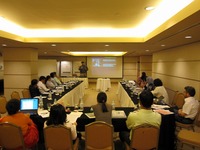 ADRC, with support from the Japan International Cooperation Agency (JICA), conducted the third year of the "NGO Training for Disaster Risk Reduction in Asia" Project from 17 to 19 August 2009 in Kuala Lumpur, Malaysia. This year, as the final year of this project, the programme aims at developing a disaster risk reduction tool booklet as an outcome of this capacity development project. Six first-year participants, ADRRN secretariat and ADRC gathered in Kuala Lumpur to further discuss on the booklet, as well as to hold a workshop on disaster risk reduction tools and methodologies.
ADRC, with support from the Japan International Cooperation Agency (JICA), conducted the third year of the "NGO Training for Disaster Risk Reduction in Asia" Project from 17 to 19 August 2009 in Kuala Lumpur, Malaysia. This year, as the final year of this project, the programme aims at developing a disaster risk reduction tool booklet as an outcome of this capacity development project. Six first-year participants, ADRRN secretariat and ADRC gathered in Kuala Lumpur to further discuss on the booklet, as well as to hold a workshop on disaster risk reduction tools and methodologies.
The workshop held on 18 August was attended by 20 people in total including a Malaysian government official, NGO officers based in Malaysia, Thailand and Japan, and a JICA officer. In the workshop, six first-year participants introduced and shared tools and methodologies which they learnt mostly through this project, focusing on how they applied them in their disaster risk reduction activities.
The workshop participants provided the first-year participants various questions and inputs such as tools' impacts to communities, application of community based disaster risk management tools in Malaysia, integration of local government officials into community projects and management of disaster memorial centers.
The first-year participants and ADRC will elaborate the tool booklet reflecting the inputs gained from the workshop and publish it by the end of this year.
(2009/08/27 17:40)
15-17 July 2009 (Bali, Indonesia)
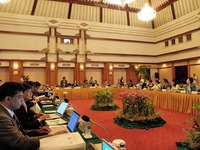 Sentinel Asia Project was established to build a disaster management system by using a satellite image in Asia region. The international conference, Joint Project Meeting for Sentinel Asia, has been held to share the latest activities every year. In this year, this conference was held in Bali, Indonesia and attended by 117 participants from 43 organizations including ADRC.
Sentinel Asia Project was established to build a disaster management system by using a satellite image in Asia region. The international conference, Joint Project Meeting for Sentinel Asia, has been held to share the latest activities every year. In this year, this conference was held in Bali, Indonesia and attended by 117 participants from 43 organizations including ADRC.
The objectives of the JPTM2009 were to introduce the progress concerning utilization of satellite and make discussion implementation of a new program for Sentinel Asia.
ADRC reported the several activities about the Emergency Observation Request in this year and the installation of the regional support office of UNSPIDER. In addition, ADRC proposed the Glacial Lake Outburst Flood Working as a new project with Keio University and ICIMOD, International Centre for Integrated Mountain Development.
(2009/07/27 18:30)
23 June 2009 (Thailand)
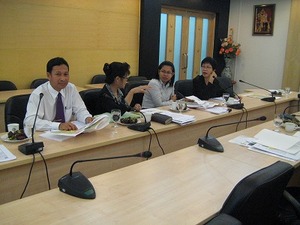 On 23rd June 2009, ADRC held the Coordination Meeting for Japan-ASEAN Integration Fund Project "Promotion of Disaster Education of Schools" in collaboration with Office of the Permanent Secretary and Basic Education Commission, the Ministry of Education of Thailand. In the meeting, the project outline was introduced and the latest situation of disaster education in Thailand was reported. A lot of materials have already been developed; therefore, it is effective to make use of them for our activity. Hereafter, the teaching materials will be drafted for the Training of Pilot Teachers.
On 23rd June 2009, ADRC held the Coordination Meeting for Japan-ASEAN Integration Fund Project "Promotion of Disaster Education of Schools" in collaboration with Office of the Permanent Secretary and Basic Education Commission, the Ministry of Education of Thailand. In the meeting, the project outline was introduced and the latest situation of disaster education in Thailand was reported. A lot of materials have already been developed; therefore, it is effective to make use of them for our activity. Hereafter, the teaching materials will be drafted for the Training of Pilot Teachers.
(2009/06/16 18:30)
10-12 June (Hanoi, Vietnam)
16-18 June (Phnom Penh, Cambodia)
23-25 June (Vientiane Province, Lao PDR)
In June 2009, the ADRC and disaster management organizations of Cambodia, Lao PDR and Vietnam conducted trainings of trainers (TOT) in the ASEAN Project: Capacity Building of Local Government Officials on Disaster Management, which aims at reinforcing capacity of local government officials in charge of disaster management in the region. After the TOT, 10 participants will give lectures to 90 local officials in each country.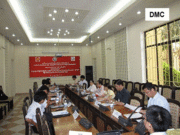
On 10 - 12 June 2009, Vietnam's Disaster Management Center (DMC) and the ADRC conducted TOT with the participants from Thua Thien Hue, Lao Cai and Tien Giang provinces and DMC. Experts from the ADRC, DMC, and Vietnam Red Cross gave lectures on risk assessment, disaster mitigation for flood, training facilities skills etc followed by town watching and community-based hazard mapping in Hanoi on the final day.
On 16-18 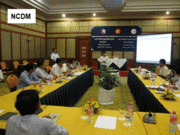 June 2009, TOT was held in Phnom Penh with topics such as total disaster risk management, Cambodia's situation about disaster risk reduction, and development planning and disaster risk reduction lectured by the country's National Committee for Disaster Management (NCDM) and the ADRC. Participants were composed of local government officials from Kompong Thom, Pursat and Kompong Chhnang provinces. On the final day, town watching / community-based hazard mapping was also organized in Kandal province.
June 2009, TOT was held in Phnom Penh with topics such as total disaster risk management, Cambodia's situation about disaster risk reduction, and development planning and disaster risk reduction lectured by the country's National Committee for Disaster Management (NCDM) and the ADRC. Participants were composed of local government officials from Kompong Thom, Pursat and Kompong Chhnang provinces. On the final day, town watching / community-based hazard mapping was also organized in Kandal province.
On 23-15 June 2009, 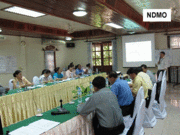 National Disaster Management Office (NDMO) of Lao PDR and the ADRC held TOT in Vientiane province with participants from Vientiane, Bolikhamsay, and Luangnamtha provinces where the experts from the ADRC, NDMO, Lao Ministry from Education and Meteorological Agency lectured on contingency planning, urban planning and disaster risk management, early warning system, and rapid assessment etc. The local officials were divided into three groups by the province and conducted hazard mapping for risk assessment.
National Disaster Management Office (NDMO) of Lao PDR and the ADRC held TOT in Vientiane province with participants from Vientiane, Bolikhamsay, and Luangnamtha provinces where the experts from the ADRC, NDMO, Lao Ministry from Education and Meteorological Agency lectured on contingency planning, urban planning and disaster risk management, early warning system, and rapid assessment etc. The local officials were divided into three groups by the province and conducted hazard mapping for risk assessment.
Through all the trainings, participating officials gained further expertise on various topics and had active discussions for coming training of local government officials. In the hazard mapping, they made risk assessment in the area based on what they learned in the TOT, discussed measures to be taken by every sector and reassured the importance of public awareness of disaster risk reduction.
Following the TOT, the three countries and ADRC will start workshops targeting local government officials from now on.
(2009/07/02 17:40)
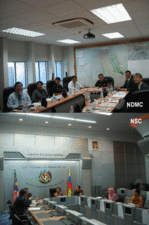 21-22 May (Bandar Seri Begawan, Brunei Darussalam)
21-22 May (Bandar Seri Begawan, Brunei Darussalam)
27-28 May (Putrajaya, Malaysia)
The ASEAN project: Capacity Building of Local Government Officials on Disaster Management was launched in Brunei Darussalam and Malaysia in May 2009. The project aims at strengthening capacity of local government officials in charge of disaster risk reduction in ASEAN countries. In 2009, the project started in the Philippines and Thailand in April.
The ADRC conducted kick-off meetings with the National Disaster Management Centre (NDMC) of Brunei Darussalam in Bandar Seri Begawan on 21-22 May, and with Malaysia's National Security Council (NSC) in Putrajaya on 27-28 May. Following the introduction about the project by the ADRC, the NDMC and NSC briefed on their disaster management systems and training systems. Then the organizations and the ADRC discussed the training schedule, topics, target areas etc considering the training needs of the countries. After training materials are developed by experts, training of trainers, and then training of local government officials are scheduled from now on.
(2009/06/29 17:40)
In support to ASEAN's implementation of the Agreement on Disaster Management and Emergency Response (AADMER), ADRC participated in the visioning workshop to help identify areas for further cooperation and support. AADMER is a comprehensive document, signed by all ASEAN Member States in July 2005, capturing not only ASEAN's intention to respond jointly and more effectively but also to reduce disaster risks in the region. It provides the overall framework for regional cooperation on disaster management in ASEAN, which embodies the region's commitment to the implementation of the Hyogo Framework for Action (HFA).
During the visioning workshop, ADRC introduced three potential projects in the context of implementing the AADMER. The first project is to conduct the feasibility study for the operationalization of the ASEAN Coordinating Centre for Humanitarian Assistance on disaster management (AHA Centre), which shall function as the operational arm of AADMER. The second project is to establish the ASEAN Disaster Management Communications Networking System (ADMCNS), which is aimed at strengthening the disaster management capacities of ASEAN Member States (AMSs) through the enhancement of communications network system that utilizes near real-time data from space satellites. The third project is to conduct a separate feasibility study for the ASEAN stockpiling, which will put up emergency stockpiles of disaster relief items.
14 May 2009 (Indonesia)
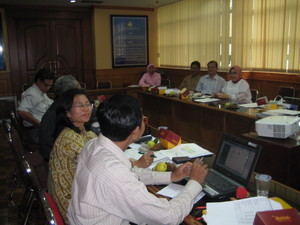
On 14th May 2009, ADRC held the Coordination Meeting for Japan-ASEAN Integration Fund Project "Promotion of Disaster Education of Schools" with the Ministry of National Education of Indonesia. In the meeting, the project outline was explained and latest situation of disaster education in Indonesia was reported. Hereafter, the teaching materials will be drafted for the Training of Pilot Teachers.
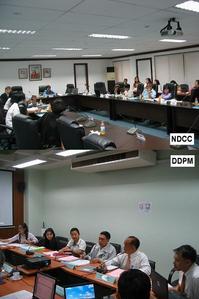 22-23 April (Manila, Philippines), 27-28 April (Bangkok, Thailand)
22-23 April (Manila, Philippines), 27-28 April (Bangkok, Thailand)
The second year program of the ASEAN project was launched in the Philippines and Thailand in April 2009, which aims at capacity building of local government officials in disaster management in the region. The program covers Brunei Darussalam, Malaysia, the Philippines and Thailand this year.
The ADRC held conducted kick-off meetings on 22-23 in Manila, and then on 27-28 April in Bangkok with the national disaster management organizations of Philippines' National Disaster Coordination Council (NDCC), and Thai Department of Disaster Prevention and Mitigation (DDMP) respectively. The participants of the meetings identified the needs for training based on the disaster management systems and training experiences of the countries. Then discussed on the program were issues such as training topics, experts to give lectures, the details for training of trainers and subsequent training for local government officials, and development of training materials. Also the participants visited training facilities for disaster management in both countries, the National Defense College of the Philippines (NDCP) of the Philippines and Disaster Prevention and Mitigation Academy (DPMA) of Thailand.
(2009/05/25 17:40)
Kick-off meeting for Multi-disciplinary Hazard Reduction from Earthquakes and Volcanoes in Indonesia
19 April 2009 (Bandung, Indonesia)
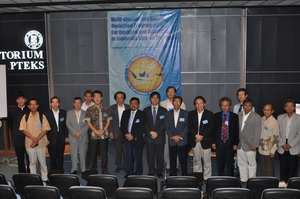
The kick-off meeting for Multi-disciplinary Hazard Reduction from Earthquakes and Volcanoes in Indonesia funded by JICA (Japan International Cooperation Agency) and JST (Japan Science and Technology Agency) was held on 21st April in Bandung Institute of Technology (ITB) and University of Tokyo. This project was approved by JICA-JST as one of the Science and Technology Research Partnership for Sustainable Development projects (http://www.jst.go.jp/global/index.html) for natural disaster prevention. The kick-off meeting was simultaneously held in ITB and University of Tokyo with the across-the-board support by the SOI (School on Internet) Asia (http://www.soi.asia/about/index.html) that is advanced internet infrastructure for information and communication technology.
In the kick-off meeting, after the opening remarks from Dr. Harjono, (Deputy to the Chair of LIPI for Earth Science, LIPI = Indonesian Institute of Science) and Prof. Satake (University of Tokyo), each group leader organized the session and discussed the project goal and implementation modality.
In the session for Group 6, Mr. Suzuki (Executive Director of Asian Disaster Reduction Center) and Dr. Pariatmono (Assistant for Deputy Minister for Development of Mathematics and Natural Science, Ministry of Research and Technology, RISTEK) facilitated the discussion on the project goals and all group leaders introduced their experiences and lessons learned on the government-academia collaboration on disaster risk reduction.
(2009/04/21 13:10)
22 March 2009 - 22 March 2010
ADRC has been implemented the project for the satellite Imagery Application to Disaster Reduction facilitated by Japan-ASEAN Integration Fund (JAIF).
Eight ASEAN member countries, namely, Indonesia, Philippines, Lao PDR, Myanmar, Thailand, Vietnam, Cambodia, Brunei Darussalam, has participated in this project.
ADRC in cooperation with the Asian Institute of Technology, AIT(http://www.ait.ac.th/) will be organizing a seminar and training in each country to enhance their capacity of satellite imagery application to disaster reduction.
To this end, the first round of kick-off meetings, were held in each country as shown below.
Based on the results of those kick-off meeting, ADRC and AIT, will work together to produce relevant materials to be used at planned seminars and trainings in each country http://www.geoinfo.ait.ac.th/adrc/index.htm
・National Institute of Aeronautics and Space, Indonesia, 22 March 2009
・Philippines Institute of Volcanic and Seismology, Philippines, 25 March 2009
・Remote Sensing Center, Lao PDR, 23 April 2009
・Ministry of Science and Technology, Myanmar, 12 May 2009
・Geo-informatics and Space Technology Development Agency, Thailand, 8 Jun 2009
・National remote Sensing Center, Vietnam, 10 July 2009
・Department of Geography, Cambodia, 27 July 2009
・Survey Department, Brunei Darussalam, 22 March 2010
(2010/03/30 13:20)
12-14 November 2008 (Bali, Indonesia)
The Asian Conference on Disaster Reduction 2008 (ACDR 2008) was held from 12-14 November 2008 in Bali, Republic of Indonesia. It was organized by the government of the Republic of Indonesia (State Ministry of Research and Technology (RISTEK)/National Disaster Management Agency (BNPB)), the government of Japan (Cabinet Office), the United Nations Secretariat of the International Strategy for Disaster Reduction (UN/ISDR), and the Asian Disaster Reduction Center (ADRC), in cooperation with the United Nations Office for the Coordination of Humanitarian Affairs (UN/OCHA) and the World Meteorological Organization (WMO). A total of 106 participants from 24 countries, mainly ADRC member countries, and from 14 organizations, including the UN, other international organizations, NGOs, and academic institutions, attended ACDR 2008.
During the sessions, reports were given on each country's progress with regard to the HFA, and participants discussed the issues that need to be examined and the direction that future efforts need to take. In addition, Mr. Shambhu Prasad Marasini from Nepal and Mr. Vu Thanh Liem from Vietnam reported on the ADRC's Visiting Researcher Program, as well as the activities they have been engaged in during their time in Japan on this program.
For furhter information, please visit the folloing site:
http://www.adrc.asia/acdr2008bali/index.html
(2008/11/30 09:50)
29-31 July 2008 (Kuala Lumpur, Malaysia)
The ADRC, with support from the Japan International Cooperation Agency (JICA), conducted the second year of the "NGO Training for Disaster Risk Reduction in Asia" Project from 29 to 31 July 2008 in Kuala Lumpur, Malaysia.
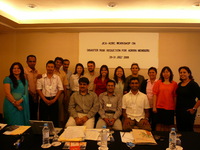 The second year program consisted of a three-day workshop during which first-year participants had a chance to share their experiences in their own countries and the knowledge they gained from the first year program with other Asian Disaster Reduction and Response Network (ADRRN) members. It was attended by six first-year participants, six new participants, and three resource persons from ADRRN members, an officer from the ADRRN Secretariat, and two researchers from the ADRC. During the workshop, participants discussed and shared their opinions on various topics including community-based disaster risk management, disaster risk reduction tools (town watching), climate change, and gender issues.
The second year program consisted of a three-day workshop during which first-year participants had a chance to share their experiences in their own countries and the knowledge they gained from the first year program with other Asian Disaster Reduction and Response Network (ADRRN) members. It was attended by six first-year participants, six new participants, and three resource persons from ADRRN members, an officer from the ADRRN Secretariat, and two researchers from the ADRC. During the workshop, participants discussed and shared their opinions on various topics including community-based disaster risk management, disaster risk reduction tools (town watching), climate change, and gender issues.
For more information, please visit the ADRC website (http://www.adrc.asia/highlights/NewsNo185).
(2009/03/16 16:50)


